#and looking for that support is just human nature (even if this issue indicates how precarious placing your entire faith
Explore tagged Tumblr posts
Text
bsd fyodor appearance headcanons (AKA how I draw him)

OVERALL PRESENCE Alluring in a doll-like way. His charm is incredible and yet in equal measure unsettling and inanimate. Many often find him, upon first meeting, a person who triggers the feeling of the uncanny valley. To them, something is off. Nobody they know or have met looks like him, and nobody should look like him. Just like a stunning porcelain doll, he takes the form of a human, and yet there is little to his expression and mannerisms that indicates he experiences humanity. His face is always carved, perfectly made. HEAD AND FACE With long, silky, inky violet hair framing his oval face, the lack of any other embellishments or accessories on his head suggests simplicity and and a natural kind of beauty. His hair's color seems simple enough from far away, appearing black to the naked eye, but upon the direct shine of light, his hair is revealed to be a cold, dark purple. Under direct sunlight, it may earn a bit of warmth and brightness. He has a sharp nose. His deep-set downturned eyes, much like his cheeks, are sunken. These qualities make him appear mature, but not old. However, the dark circles, subtle glazed redness and half-lidded appearance of his eyes make him seem as if he has lived a hundred lifetimes. He knows. He knows that you know. His face is pallid and sickly pale. Though his skin is soft and comfortably cool, he also looks ill. There are small, pale rosy spots on it and there is very little color aside from that. His nose and lips have a subtle blush to them. His lips are dry. SKIN AND BODY
Devoid of warmth, his body is equally as fair and pale as his face. His skin is thin, elastic, translucent, and cool to the touch, creating the appearance of purplish and greenish veins wrapping all around his body like thin vines. Due to the thinness of his skin, any light damage dealt to it that would otherwise not affect other people is met with quick bruising or shallow scrapes and cuts. His skin holds little color as well, apart from some rosy spots and the purples, yellows, and grays of his bruises, just like on his face. His build is distinctly different from other men. For one, he is slender with a perfect mixture of gentle curves and strategically placed sharp angles. Many may opt to call him feminine due to this, but it would be more appropriate to call him androgynous, or perhaps masculine in his own special way. This is also supported by the fact that his appetite is quite poor, and he does not eat a lot as eating until he is full can become overwhelming. He has long limbs and a long torso. Spindly arms and willowy thighs and legs. He has what is described to be the perfect set of hands for playing instruments, specifically the piano, due to their dexterity, flexibility, and length. He is also incredibly flexible, and sometimes that would pose difficulties for him. His joints easily dislocate and he may have issues with any harsh movement or constant action. Sometimes, on particularly worse days, he may even be unable to withstand constant pressure on his legs and feet from standing, and he has to sit down lest it become excruciating. He may also go lightheaded, faint or dizzy at times.
WAY OF CARRYING HIMSELF
He is reserved and private, and it shows in the way he carries himself. Entirely independent, he is quite distant and keeps his hands to himself unless it is necessary. Despite this, he does not make himself appear smaller, nor bigger. He just exists as he does, and if his presence is imposing, or pitiful, then so be it. It is not his job to police how others view him, unless it gives him an advantage. OTHER STUFF
I unironically think he has iron deficiency anemia
he has Vascular Ehlers-Danlos Syndrome (vEDS)
he runs colder than most normal people
his eyes were red as an infant and toddler but as he got older and gained a bit of melanin in his eyes, they turned purple.
He has brittle nails
his individual hair strands are weak and thin but his collective head of hair is very thick nonetheless
his voice can only reach a low-moderate loudness/decibel and if he tries to really scream out loud, screech or yell he risks losing his voice, or otherwise just creating a really unpleasant hoarseness in his throat that makes his throat extremely tender and painful.
That's it, thank you guys
#fyodor dostoyevsky bsd#fyodor dostoevsky#bsd fyodor#bsd#bsd headcanons#headcanon#character headcanons#zaragovica
25 notes
·
View notes
Note
Have you read about the new study that examined brain activity and found no overlap between male and female brains? It's mentioned here (sorry, can't post proper links): psychologytoday com/us/blog/sax-on-sex/202405/ai-finds-astonishing-malefemale-differences-in-human-brain. I haven't read it, but found it odd, considering there are several studies that claim that isn't any particular difference between male and female brains. Are they using different parameters or sth? Love your blog btw <3
Hi Anon!
I had not seen this study [1], yet, and it's very interesting!
I've talked before about how past research indicates there is not a substantial difference between female and male brains. Given the fact that we can find sex differences in many other body systems (e.g., the immune system) and the extent of gendered socialization, I was actually genuinely surprised that the current state of research is so strongly against any sex differences in the brain.
All of this is to clarify the perspective I approached this paper from. However, after reading it, I do not think that it provides strong support for sex differences in male and female brains. (It's still interesting! It just doesn't prove what people think it proves.)
---
So, the issues:
Replication
First, this is just one study, and as we've seen in previous research (see linked post above), many single studies actually do find significant sex differences. The issue comes in when you analyze across many different studies, you see that these differences are not consistent across studies. So, for example, study 1 may find that brain area A is significantly larger in males than in females and report this as evidence of a sex difference. Then study 2 finds that brain area A is significantly smaller in males than in females and reports this as evidence of a sex difference. On the surface, this would seem like there are now two studies proving a sex difference in brain area A. It's only when you combined the results of both of these studies that you can determine brain area A size is unlikely to be linked by sex.
So, that's the first problem with this study: it has not been replicated in other samples.
This is a particular problem considering the weight of evidence we have against this outcome. In other words, a single contradictory study does not, and inherently cannot, "prove" all other studies wrong.
In this same vein, even their exact model's accuracy fell to ~80% when tested on other data sets. Considering that average accuracy purely by chance would be ~50%, this drop is substantial. It also brings the overall repeatability of their study into question.
And in addition to all of that, they don't appear to be reporting the direction of each sex difference (i.e., more activity in X in males), which loops back in first point with the repeatability issues. Specifically, even if another study did replicate these findings, we have no way to tell if the direction of the sex differences in each brain area corresponds with or contradicts the direction in this study.
Methodological Limitations
That naturally leads into another issue: the limitations in their methodology.
To start, you are correct that they are using a very different methodology from past papers. Specifically, they are using a "spatiotemporal deep neural network" to analyze fMRI data. The essentially means they are using artificial intelligence to analyze data about the activity of men's and women's brains.
The first problem I can see here is that both of these (AI and fMRI) are prone to false positives. First, fMRI is looking at thousands of different data points for every individual, as a result, if you don't properly correct for this, you can get "positive" results for spurious observations. An amusing example is the researchers who found brain activity in the fMRI results of a dead fish [2]. Obviously, this is ridiculous, and you can mitigate this problem by adjusting your analysis methodology. But in this case, it highlights how the raw data from fMRI scans can produce positive findings where we know there is no real positive finding.
And this is relevant, because, in this study, they are feeding all of that massive data into a deep learning AI model. These sorts of models are almost notorious for their over-fitting, data bias, and un-generalizability. An amusing example is described in this paper [3], where they describe how another neural net (the same sort of AI as in this paper) was able to accurately determine if an image was of a husky or a wolf. The problem is that the model was actually using the image background (presence of snow) to make the prediction. This illustrates an important issue with AI: the model isn't always using the information we care about when making predictions.
Obviously, if this is occurring the current study it would not be as egregious; unfortunately, given the fact that fMRI data is not human readable it would also be much more difficult to detect.
As an example, the one reliable sex difference we see in brains is brain size. Men's brains are, on average, larger than women's brains. So, if you train a model on data that has not been adjusted for brain size, the model would have exceptionally high accuracy ... but it's only demonstrating the fact that sex is an accurate predictor of brain size. (For this study, I cannot find any explicit explanation of if or how they took brain size into account, but they have an exceptional amount of supplementary field-specific technical details it may have been included in.)
And then, even if we disregarded all the caveats above and accept their results at face-value then ... reliable sex differences in the brain would only be identifiable in "latent functional brain dynamics" or brain "fingerprints". They describe this as a "unique whole brain pattern of an [AI] model feature importance that classifies that individual as either female or male". In other words, no single area had reliable predictive values, only "whole brain patterns".
Causation vs Correlation
Lastly, and unsurprisingly, this study also runs into a pervasive issue in neuroscience: it cannot determine causation.
This study was done completely on adult participants, which means that all the participants had already undergone a lifetime of gendered socialization. I discuss this in the linked post above, but to reiterate, we cannot know whether "sex -> brain difference" or if "sex -> differences in socialization -> brain difference" for any study on adults. (And most likely even on children.)
---
In conclusion, this a very interesting study, but it doesn't disprove all the other research indicating a lack of differences in human brains between the sexes. Given the methodological limitations of the study, I think it's unlikely it will ever be successfully replicated, and without replication it cannot be confirmed. And even then, evidence of difference between the sexes would not – on its own – confirm that sex causes the difference (i.e., given the highly plastic nature of the brain it's entirely possible that gendered socialization would result in any observed differences).
I hope that helps you, Anon!
References below the cut:
Ryali, S., Zhang, Y., de Los Angeles, C., Supekar, K., & Menon, V. (2024). Deep learning models reveal replicable, generalizable, and behaviorally relevant sex differences in human functional brain organization. Proceedings of the National Academy of Sciences, 121(9), e2310012121.
Lyon, L. (2017). Dead salmon and voodoo correlations: should we be sceptical about functional MRI?. Brain, 140(8), e53-e53.
Ribeiro, M. T., Singh, S., & Guestrin, C. (2016, August). " Why should i trust you?" Explaining the predictions of any classifier. In Proceedings of the 22nd ACM SIGKDD international conference on knowledge discovery and data mining (pp. 1135-1144).
15 notes
·
View notes
Text
Dog Knee Braces: The Surprising Solution Your Dog Might Need!

Imagine your dog, once the lively pup who chased balls and ran at top speed, suddenly limping, hesitant to take even a short walk. This can be heart-wrenching for any dog owner, but what if the solution is simpler than you think? Enter the dog knee brace—a surprisingly effective and often overlooked tool in helping your furry friend regain their mobility.
Whether your dog is recovering from surgery, battling a degenerative condition like arthritis, or dealing with a knee injury, a dog knee brace can provide much-needed support. Most owners would be shocked to learn how impactful this device can be in not only easing pain but also preventing further damage.
The Science Behind Dog Knee Braces
A dog knee brace is specifically designed to offer stability to the knee joint, which can be crucial if your dog is suffering from conditions like patellar luxation or an ACL injury. Just like humans, dogs need support to heal properly when these joints are compromised. In fact, studies have shown that knee braces can significantly reduce pain and increase the mobility of dogs suffering from cruciate ligament injuries. According to the American College of Veterinary Surgeons, ACL injuries are common in dogs, with the majority occurring in large breed dogs, but even smaller breeds are affected.
Interestingly, a study published in the Journal of Veterinary Surgery in 2021 found that canine leg braces helped improve joint function and reduced the need for invasive surgeries in 50% of dogs with moderate knee injuries. This indicates that a dog knee brace can be a game-changer for both the dog's comfort and your wallet!
Why Consider a Dog Knee Brace?
While you may have considered treatments like surgery or medication, many dog owners overlook the potential of a dog knee brace. This solution can:
Reduce Pain and Swelling: A properly fitted knee brace can alleviate pressure on the knee joint, providing relief from chronic pain and swelling.
Improve Mobility: Whether it’s arthritis or a post-surgery recovery, dog leg braces can help your dog move more freely.
Prevent Further Damage: If your dog has a tendency to injure the same knee again, a dog leg brace can help prevent this and avoid future costly treatments.
Promote Faster Healing: Supporting the injured area can promote quicker healing and reduce recovery time.
The Reality of Dog Braces: What Most Don’t Tell You
A dog knee brace isn’t a one-size-fits-all solution. Unlike human braces, which come in various sizes and types, finding the right fit for your dog requires careful attention to detail. The brace must not be too tight (which can cause circulation issues) or too loose (which will fail to offer support). That’s why custom dog knee braces are often a recommended option, especially for dogs recovering from surgery or dealing with severe joint issues.
Many websites emphasize the "quick fix" nature of these braces, but they fail to mention that proper fitting and consistent use are key. It's not just about buying a brace off the shelf; it’s about finding one that fits your dog’s specific measurements and condition. You might even want to consult your vet to make sure the brace is the right solution.
Final Thoughts: A Simple Yet Powerful Tool
As a dog owner, you want nothing but the best for your dog’s health. If you’re looking for a non-invasive solution to help your dog recover from knee pain or injury, a dog knee brace might be the answer. With the right care, a dog knee brace can improve your dog’s quality of life and restore their mobility, giving them the freedom to run and play again.
So, next time your dog struggles to jump or chase after a toy, consider the surprising solution of a dog knee brace—your dog might just thank you with a wagging tail and a joyful run!
0 notes
Text
Understanding Gut Health for Dogs: A Comprehensive Guide
When it comes to our furry companions, gut health for dogs is a topic that deserves our attention. A healthy gut can lead to improved digestion, enhanced immune function, and even a better mood. At Unleash Wellness, we believe that understanding the importance of gut health for dogs can help pet owners provide the best possible care for their beloved animals.
The Importance of Gut Health for Dogs
Gut health for dogs is essential not just for their digestive system, but also for their overall well-being. A balanced gut microbiome can support nutrient absorption, reduce inflammation, and even influence behavior. Just like in humans, an imbalance in gut bacteria can lead to various health issues, including allergies, obesity, and gastrointestinal disorders.
Signs of Poor Gut Health in Dogs
Recognizing the signs of poor gut health in dogs is crucial for early intervention. Here are some common symptoms to look out for:
Digestive Issues: Frequent vomiting, diarrhea, or constipation can indicate that your dog’s gut health is compromised. If you notice these symptoms, it's important to consult a veterinarian.
Skin Problems: Many skin conditions in dogs are linked to gut health. If your dog has unexplained itching, redness, or hotspots, it could be a sign of an underlying digestive issue.
Behavioral Changes: Just as a healthy gut can improve mood in humans, the same applies to dogs. If your dog is more anxious or irritable than usual, it might be worth exploring their gut health.
At Unleash Wellness, we offer products specifically designed to support gut health for dogs, helping to address these issues naturally.
How to Promote Gut Health for Dogs
Promoting gut health for dogs can be achieved through several lifestyle changes and dietary adjustments. Here are some effective strategies:
Balanced Diet: Providing a high-quality diet rich in prebiotics and probiotics is essential for maintaining a healthy gut. Look for dog foods that list natural ingredients and contain probiotics that aid digestion.
Regular Exercise: Physical activity is vital for overall health, including gut health. Regular exercise helps to promote a healthy digestive system and can reduce the risk of obesity, which is often linked to poor gut health.
Supplements: Consider incorporating gut health supplements specifically designed for dogs. At Unleash Wellness, our range of gut health products includes natural probiotics and digestive enzymes that can help maintain a healthy gut microbiome.
The Role of Probiotics in Gut Health for Dogs
Probiotics play a significant role in supporting gut health for dogs. These beneficial bacteria help balance the gut microbiome, making it easier for your dog to digest food and absorb nutrients.
Digestive Health: Probiotics can help alleviate digestive issues by restoring the natural balance of bacteria in the gut. This can be particularly helpful after antibiotic treatment, which can disrupt gut flora.
Immune Support: A healthy gut is closely linked to a strong immune system. By incorporating probiotics into your dog's diet, you can enhance their overall immune response, making them less susceptible to infections.
Behavioral Improvement: As mentioned earlier, gut health influences mood and behavior. Probiotics can help regulate neurotransmitters in the gut, potentially reducing anxiety and promoting a calmer demeanor.
At Unleash Wellness, we offer various probiotic formulations designed specifically for dogs, helping you to support their gut health effectively.
Conclusion: Investing in Your Dog’s Gut Health
Maintaining gut health for dogs is an essential aspect of pet care that can lead to a happier and healthier life for your furry friend. By recognizing the signs of poor gut health and implementing dietary and lifestyle changes, you can significantly improve your dog’s overall well-being.
If you're looking for quality products to support gut health for dogs, Unleash Wellness has you covered. Our specially formulated supplements and foods are designed to promote optimal gut health, ensuring that your dog lives a long, healthy, and happy life.
Remember, a healthy gut leads to a happy dog. Make the commitment today to invest in your dog’s gut health, and you will be rewarded with a loyal and vibrant companion for years to come.
For more information on our products and to explore our offerings, visit our website at Unleash Wellness. Together, we can enhance your dog's quality of life, one paw at a time.
0 notes
Text

The Ever-Disappearing Spoons Around the World
In my shared apartment, it feels like spoons are almost gone. I can't tell if my roommates are taking them and not bringing them back, or if we just need a lot more spoons. What’s even stranger is that it seems like forks are multiplying like crazy instead. Or maybe that’s just my imagination…
Lately I read an interesting article about teaspoons disappearing.
It’s a well-known story, but it seems that teaspoons go missing all over the world. In Melbourne, Australia, researchers at the Macfarlane Burnet Institute secretly numbered 70 teaspoons to track them. After 5 months, they found that 80% of the teaspoons had disappeared!
The researchers came to a funny conclusion: “Somewhere in the universe, there is a planet full of spoon-like life forms. These beings live with humanoids, reptiles, tree-dwelling creatures, and smart, blue-colored aliens. And these spoons regularly abduct our teaspoons!” In other words, “Spoons are alive!”
This institute has published many famous papers (though none have won the Ig Nobel Prize, despite being quite famous). In another study, they looked at how long it takes for half the teaspoons to disappear. This is called the “half-life.” They found that the half-life of a teaspoon was 81 days, but in shared tea rooms, it was only 42 days. From this, they calculated that the institute loses about 360 teaspoons per year. To keep 70 usable teaspoons, they need to buy about 250 new ones every year (since spoons are “alive”!).
This research on the everyday mystery of disappearing teaspoons is very interesting! It seems like the spoons are trying to escape human control.
The study also found that losing teaspoons in the workplace is a fast process. This can be a problem for office culture. People may start using forks, knives, or even staplers to measure coffee or sugar. This wastes time and makes employees unhappy, which lowers work efficiency. So, it’s actually a serious issue!
The institute estimates that it costs about 100 Australian dollars per year to keep enough teaspoons. If this happens at many workplaces, the total cost is quite large!
Interestingly, this problem is not only in Australia. Another study found that teaspoons also disappear in hospitals and research centers in France. So, it’s already known to be an international issue! Right now, researchers are comparing how often teaspoons disappear in Australia and France.
Back to the UFO story about spoons—opinions are divided at the Macfarlane Burnet Institute. Some researchers support “counterphenomenological resistentialism,” which means “objects are against us” (les choses sont contre nous). This idea is that objects, like teaspoons, have a natural dislike for humans and try to escape.
Maybe the rate of disappearing teaspoons in Japan is lower than in other countries, but this research provides lots of useful information!
So, probably, the spoons in my apartment are also participating in this movement.
Sources:
1. [Los Angeles Times - Where do teaspoons disappear to?](https://www.latimes.com/food/dailydish/la-dd-disappearing-teaspoons-burnett-institute-20141105-story.html)
2. [The Irish Times - Missing spoons mystery stirs up the interest of scientists](https://www.irishtimes.com/news/missing-spoons-mystery-stirs-up-the-interest-of-scientists-1.1287998)
3. [The BMJ - The case of the disappearing teaspoons](https://www.bmj.com/content/332/7533/121.1)
4. [Disappearing teaspoons: French data indicate global phenomenon | The BMJ](https://www.bmj.com/content/332/7533/121.1)
0 notes
Text
Cats as Therapy Animals: How Our Feline Friends Can Improve Our Mental Health

Cats have been our beloved companions for thousands of years, but did you know that they can also be therapy animals? Therapy animals are animals that are trained to provide emotional support to people in need, and cats are just as effective as dogs in this role. In fact, cats have unique qualities that make them especially good therapy animals. Let's take a closer look at how our feline friends can improve our mental health.
First and foremost, cats are incredibly calming animals. Their soft purring and gentle movements can have an almost hypnotic effect on us, helping us to relax and de-stress. Studies have shown that spending time with a cat can lower our heart rate and blood pressure, which are both indicators of stress. In addition, the act of stroking a cat can release oxytocin, a hormone that helps to reduce anxiety and promote feelings of well-being.
Another way that cats can improve our mental health is by providing us with companionship. Cats are independent creatures, but they also crave attention and affection from their human companions. For people who live alone or are feeling lonely, having a cat can provide a sense of companionship and help to alleviate feelings of isolation. In fact, studies have shown that owning a pet can increase social support and reduce feelings of loneliness.
Cats can also be a source of entertainment and distraction, which can be helpful for people who are dealing with depression or anxiety. Watching a cat play or interact with its environment can be a simple but effective way to take our minds off our problems and focus on something positive. In addition, cats are known for their playful and mischievous nature, which can help to bring some levity to difficult situations.
Finally, cats can provide a sense of purpose and responsibility. Caring for a cat requires feeding, grooming, and providing medical care, which can give us a sense of purpose and accomplishment. For people who are struggling with depression or low self-esteem, having a cat can provide a sense of responsibility and motivation to take care of themselves and their pet.
Of course, not everyone is able to have a cat as a therapy animal. Allergies, living in a rental property that doesn't allow pets, or financial constraints can all make it difficult to have a cat. However, even spending time with cats in a therapy setting can be beneficial. Many hospitals, nursing homes, and other care facilities have therapy cat programs that allow patients to interact with cats in a controlled environment.
|Cats have a lot to offer as therapy animals. Their calming presence, companionship, entertainment value, and sense of purpose can all contribute to improved mental health. Whether you have a cat of your own or spend time with therapy cats, these feline friends can be a valuable tool in managing mental health issues.
0 notes
Text
I read this post and couldn't scroll past it without giving my 2 cents so apologies in advance because I'm going to have to disagree. And this 100% isn't me trying to start an argument or anything!!! I just like friendly discussion about things and I have a lot to say about this one so let's get into it.
I think a lot of queer stories, and Yaz’s story included, are meant to be a bit ambiguous to allow viewers to relate to it in whatever way they would prefer to fill in the blanks. So for me, I personally do see her story as a coming out one, and the fact that so many other people do as well should be indicative of perhaps how the story was intended to be received. Stories are meant to be an introspection of ourselves, we relate our own experiences to whatever characters we like, that's honestly just human nature. So if queer people see their own coming out stories in and relate theirs to Yaz's then I don't think that's necessarily something to critique.
I've always interpreted Najia's comment in Arachnids to be something more along the lines of -- I'm pretty sure my kid is queer but they haven't explicitly told me so I'm going to be supportive where I can. ?? If that makes sense?? The way she asks, to me, reads as "Is there something you would like to tell me?" The tone of voice, the body language. Yaz’s immediate denial of it. Her annoyance when she responds -- because why would her mum just straight up ask something like that in a room full of other people. Even before we got confirmation of Yaz actually being queer, I felt like her mum's question was her testing the waters to see if her suspicions were true.
And when it comes to Yaz’s story arc overall, I honestly can't see it as anything but a confused queer teen who got bullied in school for her sexuality. (And the mental health issues that came with it) Every fic/analysis I've written regarding Yaz’s experience has toed around that idea and I refuse to write it any other way. (So perhaps I just have a special attachment to this expansion of her character but I have seen others interpret it similarlyso it isn't just me, I swear.) Only some of that is explicitly stated in canon, we do know that she has battled with depression, possibly anxiety, and it's implied that she was contemplating taking her own life when she ran away, but when I do the math, it's the only way I can piece together the information we've been given. And thats not to say her coming out is the whole arc she has, because it certainly isn't. Obviously theres a whole other main arc she has that is supported by the coming out arc, but that's not what this post is about so I'll refrain from infodumping about that. But I digress. Back to the main idea.
The Conversation(tm) in EotD is mainly what sells the coming out idea to me, if it weren't for that scene and you just told me Yaz was queer the whole time and that was it, okay cool I believe she's been out already and we move on. But Dan confronting her about her crush on the Doctor in this way just cannot compute in my head as anything but coming out. Her initial deflection, the body language, "I don't know what to do, Dan" and "I've never told anyone. Not even myself" sounds exactly like someone who is having a proper gay crush for the first time and doesn't know how to process the feelings. So much so that she can't even admit it to herself. Heck, even before Dan came along, we see glimpses of this in RotD when Jack confronts her. She denies it. "I just missed her." And that sounds like someone who's denying the fact that they're having a gay crush for the first time. The scenes actually have a lot of similarities if you look at them side by side, there was a gifset someone made of it when I made a post talking about the similarities. The dialogue, the body language, the CLOTHES and hair are even almost the same. So putting those two scenes as direct parallels like that??? It tells the story of her coming to terms with what she tried to deny for so long. Because she isn't just coming out to Dan in EotD, she's coming out to herself as well.
This whole time she's been infatuated with this weird alien woman and she didn't understand why. When she thought she was walking off to her death she was obsessed with trying to find her for months where she ignored her friends and family. When she saw her again she shoved her because she couldn't cope with the confused feelings she felt. And then once they were alone long enough tensions became high and then some random Scouse came along and thought "hey... maybe you two like each other a bit" and it flipped her entire world upside down because it suddenly all made sense and she didn't know how to handle it. That is ultimately how I view her queer experience as seen on screen.
Also this is just me being silly but part of it for me that really sells it that I made a post about a few months back --- and I'm just going to ss it because I don't feel like typing it out again:

(but this is merely my own interpretation of the events as I can relate to them and it's also me just having fun so take this with a grain of salt)
Like once we get to Flux, this is genuinely how I view their relationship. They argue a lot, there's a sort of codependency between them, those sorts of things. And like we obviously have in-universe reasons -- the actual Flux itself, the Timeless Child, etc. etc. --- for them to be at each other's throats like that but tbh??? I just think it's fun to compare their treatment of each other to this because it's almost a rite of passage for every closeted queer/wlw person and so Yaz must therefore also experience it (and she has!!). It is a canon event and I cannot interfere.
I also would like to point out how Yaz's story compares to other queer characters on the show as a whole, not just talking about her/Thirteen's/Chibnall's era. (At least, comparing her to nuWho, I can't speak for Classic Who) We've seen many-a queer character on DW who are very secure in their sexuality and speak openly about it: the Doctor on occasion, Jack, Bill, Clara, lots of side characters who had one whole line of dialogue --- so to have a queer character who is unsure of their sexuality and who is still figuring things out is refreshing. Not everyone's queer experience is loud and bold, not everyone knows how to navigate it; and the fact that we get to experience it along with her is really special. I think it's written so beautifully and it's just a perfect portrayal of what it's like to go through such a thing. It's very real to me. It hits home.
Ultimately at the end of the day, I do think Yaz's story is a coming out one. Always have and always will think that. The conversations you want to expand on the specifics of her character maybe didn't happen on-screen, but we are having them all the time on here. The nature of the Chibnall era of DW is unfortunately fill-in-the-blank a lot of times, especially with the bits that were produced during the pandemic where a lot had to be cut so no one got sick and died. So, as far as I'm aware, we as fans have come to this general consensus when we filled in the blanks. I can see you saying that you just in general don't agree with it, but to say that it baffles you... well, that baffles me. The puzzle pieces fit together so well I just cannot fathom any other interpretation. And also I get not wanting to credit a story for something it isn't explicitly what fans give it credit for (especially for LGBTQ+ stories it's a tough thing to navigate) but I don't want that to discredit the fact that the story exists at all because there are still so many aspects of it that are worth giving credit to it for.
Endlessly baffled by Yaz being treated definitively as a coming out story by fandom. We don't know if she was out or not. If anything, if we're to take Arachnids as retroactive setup, her mum knows already. And the dialogue in Eve while familiar to the coming out experience could just be referring to her crush on the Doctor. I don't want to give credit for a specific variety of queer story being told unless it's told.
Conversations expanding on the specifics of her experience are the sort of thing I feel like her story desperately needed and never got.
#this got away from me but anywayssss lol#always a yaz coming out truther#and again this is just me having fun i do not intend to get on anyones bad side with this lmao#but yeah whatever#doctor who#yasmin khan#dw meta
38 notes
·
View notes
Text
Giving Quality, Motivating Feedback
A guest post by @shealynn88!
The new writer in your writing group just sent out their latest story and it’s...not exciting. You know it needs work, but you’re not sure why, or where they should focus.
This is the blog post for you!
Before we get started, it’s important to note that this post isn’t aimed at people doing paid editing work. In the professional world, there are developmental editors, line editors, and copy editors, who all have a different focus. That is not what we’re covering here. Today, we want to help you informally give quality, detailed, encouraging feedback to your fellow writers.
The Unwritten Rules
Everyone seems to have a different understanding of what it means to beta, edit, or give feedback on a piece, so it’s best to be on the same page with your writer before you get started.
Think about what type of work you’re willing and able to do, how much time you have, and how much emotional labor you’re willing to take on. Then talk to your writer about their expectations.
Responsibilities as an editor/beta may include:
Know what the author’s expectation is and don’t overstep. Different people in different stages of writing are looking for, and will need, different types of support. It’s important to know what pieces of the story they want feedback on. If they tell you they don’t want feedback on dialogue, don’t give them feedback on dialogue. Since many terms are ambiguous or misunderstood, it may help you to use the list of story components in the next section to come to an agreement with your writer on what you’ll review.
Don’t offer expertise you don’t have. If your friend needs advice on their horse book and you know nothing about horses, be clear that your read through will not include any horse fact checking. Don’t offer grammar advice if you’re not good at grammar. It doesn’t mean you shouldn’t give feedback on things you do notice, but don’t misrepresent yourself, and understand your own limits.
Give positive and constructive feedback. It is important for a writer to know when something is working well. Don’t skimp on specific positive feedback — this is how you keep writers motivated. On the other hand, giving constructive feedback indicates where there are issues. Be specific on what you’re seeing and why it’s an issue. It can be hard for someone to improve if they don’t understand what’s wrong.
Be clear about your timing and availability, and provide updates if either changes. Typically, you’ll be doing this for free, as you’re able to fit it in your schedule. But it can be nerve wracking to hand your writing over for feedback and then hear nothing. For everyone’s sanity, keep the writer up to date on your expected timeline and let them know if you’re delayed for some reason. If you cannot complete the project for them, let them know. This could be for any reason — needing to withdraw, whatever the cause, is valid! It could be because working with the writer is tough, you don’t enjoy the story, life got tough, you got tired, etc. All of that is fine; just let them know that you won’t be able to continue working on the project.
Be honest if there are story aspects you can’t be objective about. Nearly all of your feedback is going to be personal opinion. There are some story elements that will evoke strong personal feelings. They can be tropes, styles, specific characterizations, or squicks. In these cases, ask the writer to get another opinion on that particular aspect, or, if you really want to continue, find similar published content to review and see if you can get a better sense of how other writers have handled it.
Don’t get personal. Your feedback should talk about the characters, the narrator, the plotline, the sentence structure, or other aspects of the story. Avoid making ‘you’ statements or judgements, suggested or explicit, in your feedback. Unless you’re looking at grammar or spelling, most of the feedback you’ll have will be your opinion. Don’t present it as fact.
Your expectations of the writer/friend/group member you are working with may include:
Being gracious in accepting feedback. A writer may provide explanations for an issue you noticed or seek to discuss your suggestions. However, if they constantly argue with you, that may be an indicator to step back.
Being responsible for emotional reactions to getting feedback. While getting feedback can be hard on the ego and self esteem, that is something the writer needs to work on themselves. While you can provide reassurance and do emotional labor if you’re comfortable, it is also very reasonable to step back if the writer isn’t ready to do that work.
Making the final choice regarding changes to the work. The writer should have a degree of confidence in accepting or rejecting your feedback based on their own sense of the story. While they may consult you on this, the onus is on them to make changes that preserve the core of the story they want to tell.
Some people aren’t ready for feedback, even though they’re seeking it. You’re not signing up to be a psychologist, a best friend, or an emotional support editor. You can let people know in advance that these are your expectations, or you can just keep them in mind for your own mental health. As stated above, you can always step back from a project, and if writers aren’t able to follow these few guidelines, it might be a good time to do that. (It’s also worth making sure that, as a writer, you’re able to give these things to your beta/editor.)
Specificity is Key
One of the hardest things in editing is pinning down the ‘whys’ of unexciting work, so let’s split the writing into several components and talk about evaluations you can make for each one.
You can also give this list to your writer ahead of time as a checklist, to see which things they want your feedback on.
Generally, your goal is going to be to help people improve incrementally. Each story they write should be better than the previous one, so you don’t need to go through every component for every story you edit. Generally, I wouldn’t suggest more than 3 editing rounds on any single story that isn’t intended for publication. Think of the ‘many pots’ theory — people who are honing their craft will improve more quickly by writing a lot of stories instead of incessantly polishing one.
With this in mind, try addressing issues in the order below, from general to precise. It doesn’t make sense to critique grammar and sentence structure if the plot isn’t solid, and it can be very hard on a writer to get feedback on all these components at once. If a piece is an early or rough draft, try evaluating no more than four components at a time, and give specific feedback on what does and doesn’t work, and why.
High Level Components
Character arc/motivation:
Does each character have a unique voice, or do they all sound the same?
In dialogue, are character voices preserved? Do they make vocabulary and sentence-structure choices that fit with how they’re being portrayed?
Does each character have specific motivations and focuses that are theirs alone?
Does each character move through the plot naturally, or do they seem to be shoehorned/railroaded into situations or decisions for the sake of the plot? Be specific about which character actions work and which don’t. Tell the writer what you see as their motivation/arc and why—and point out specific lines that indicate that motivation to you.
Does each character's motivation seem to come naturally from your knowledge of them?
Are you invested (either positively or negatively) in the characters? If not, why not? Is it that they have nothing in common with you? Do you not understand where they’re coming from? Are they too perfect or too unsympathetic?
Theme:
It’s a good idea to summarize the story and its moral from your point of view and provide that insight to the writer. This can help them understand if the points they were trying to make come through. The theme should tie in closely with the character arcs. If not, provide detailed feedback on where it does and doesn’t tie in.
Plot Structure:
For most issues with plot structure, you can narrow them down to pacing, characterization, logical progression, or unsatisfying resolution. Be specific about the issues you see and, when things are working well, point that out, too.
Is there conflict that interests you? Does it feel real?
Is there a climax? Do you feel drawn into it?
Do the plot points feel like logical steps within the story?
Is the resolution tied to the characters and their growth? Typically this will feel more real and relevant and satisfying than something you could never have seen coming.
Is the end satisfying? If not, is it because you felt the end sooner and the story kept going? Is it because too many threads were left unresolved? Is it just a matter of that last sentence or two being lackluster?
Point Of View:
Is the point of view clear and consistent?
Is the writing style and structure consistent with that point of view? For example, if a writer is working in first person or close third person, the style of the writing should reflect the way the character thinks. This extends to grammar, sentence structure, general vocabulary and profanity outside of the dialogue.
If there is head hopping (where the point of view changes from chapter to chapter or section to section), is it clear in the first few sentences whose point of view you’re now in? Chapter headers can be helpful, but it should be clear using structural, emotional, and stylistic changes that you’re with a new character now.
Are all five senses engaged? Does the character in question interact with their environment in realistic, consistent ways that reflect how people actually interact with the world?
Sometimes the point of view can feel odd if it’s too consistent. Humans don’t typically think logically and linearly all the time, so being in someone’s head may sometimes be contradictory or illogical. If it’s too straightforward, it might not ‘feel’ real.
Be specific about the areas that don’t work and break them down based on the questions above.
Pacing:
Does the story jump around, leaving you confused about what took place when?
Do some scenes move quickly where others drag, and does that make sense within the story?
If pacing isn’t working, often it’s about the level of detail or the sentence structure. Provide detailed feedback about what you care about in a given scene to help a writer focus in.
Setting:
Is the setting clear and specific? Writing with specific place details is typically more rooted, interesting, and unique. If you find the setting vague and/or uninteresting and/or irrelevant, you might suggest replacing vague references — ‘favorite band’, ‘coffee shop on the corner’, ‘the office building’ — with specific names to ground the setting and make it feel more real.
It might also be a lack of specific detail in a scene that provides context beyond the characters themselves. Provide specific suggestions of what you feel like you’re missing. Is it in a specific scene, or throughout the story? Are there scenes that work well within the story, where others feel less grounded? Why?
Low Level Components
Flow/Sentence Structure:
Sentence length and paragraph length should vary. The flow should feel natural.
When finding yourself ‘sticking’ on certain sentences, provide specific feedback on why they aren’t working. Examples are rhythm, vocabulary, subject matter (maybe something is off topic), ‘action’ vs ‘explanation’, passive vs. active voice.
Style/Vocabulary:
Writing style should be consistent with the story — flowery prose works well for mythic or historical pieces and stories that use that type of language are typically slower moving. Quick action and short sentences are a better fit for murder mysteries, suspense, or modern, lighter fiction.
Style should be consistent within the story — it may vary slightly to show how quickly action is happening, but you shouldn’t feel like you’re reading two different stories.
SPAG (Spelling and Grammar):
Consider spelling and grammar in the context of the point of view, style and location of the story (eg, England vs. America vs. Australia).
If a point of view typically uses incorrect grammar, a SPAG check will include making sure that it doesn’t suddenly fall into perfect grammar for a while. In this case, consistency is going to be important to the story feeling authentic.
Word Count Requirements:
If the story has been written for a project, bang, anthology, zine, or other format that involves a required word count minimum or maximum, and the story is significantly over or under the aimed-for word count (30% or more/less), it may not make sense to go through larger edits until the sizing is closer to requirements. But, as a general rule, I’d say word count is one of the last things to worry about.
*
The best thing we can do for another writer is to keep them writing. Every single person will improve if they keep going. Encouragement is the most important feedback of all.
I hope this has helped you think about how you provide feedback. Let us know if you have other tips or tricks! This works best as a collaborative process where we all can support one another!
2K notes
·
View notes
Text
For today’s ‘i really, really love kang yohan’ post, we’re gonna be develing into a little bit of emotional intelligence and the fact that Yohan both possesses it while simultaneously doesn’t, lmao.
Yohan is portrayed as a hunter and a shark. He’s said this himself in his own words. He’s read up on dynamics of humans and instincts and basis himself off of a monster for a couple of different reasons, but the main one being the fact that people believed him to be as such instead of coming down to his level as a child to understand him.
This by far, means Yohan was emotionally neglected (physically too, but that’s, in some ways, addressed in my other meta post) by parental figures in his life except for the nanny, possibly, on occasion, and isaac - but even then, we know it must’ve only been to a certain extent. On top of that, yohan’s only true witness to emotions is through those people in the house, and needless to say, one of them was off the walls abusive.
It’s why we get scenes like the choking one because when Yohan is angry, guess how he’s learned to express that? It’s physical, but it ties in emotionally. Yohan lashes out the only way he knows how, but this is also an indicator that he’s lied about being a monster. Why? Because people with extreme reactions to emotionally charged questions (like your associate judge accusing you of killing your brother, for example) can often mean that it’s more than just a sensitive topic; it actually matters to that person. At this point, gaon does not know isaac’s story, but we later learn yohan’s version of the fire, and it’s slowly revealed through Elijah, specifically, just how much family is a tough topic for Yohan.
And fortunately, gaon sees right through yohan’s bullshit when he calls him out about how he should be a victim, not a monster. Which opens up the door to us understanding why Yohan does what he does and says what he says even more because it’s revealed through that conversation that these are specific words Yohan has heard before. So not only has he been emotionally stunted as a child by way of abuse, he’s had so many people in his life look at him as a callous monster. And when that happens, don’t you start to believe it? Don’t you lose a little bit of your humanity and become the very thing people say you are?
However, this is also yohan’s strength in the world he lives in, especially with the intent to seek revenge for Isaac. He can put his emotions aside and think clearly, even in situations that should rile him up. You can actually see him get… amused when someone tries to put him in a corner. Yohan doesn’t rely on emotions because it’s logic, rational and strategy that gets him every single checkmate. It’s what’s got him to the point he’s at now. It’s how he’s able to push gaon into seeing reason because if you look at things from the perspective of philosophy and science (by way of human nature), it becomes easier to see a path and a plan so very clearly to whatever outcome you’re wanting.
The issue that comes into play circles back around with family. Because Yohan did not grow up in a healthy environment, he doesn’t know what family actually means and what dynamic it should look like. The past several years he’s spent with Elijah, he’s lived it logically because it means keeping her safe without taking into consideration the fact that Elijah is not like himself and did not grow up in the same environment he did. Only, Yohan also has a habit of not telling anyone his plans, and that’s where the miscommunication starts. How is Elijah to know why Yohan keeps her away from the world? It’s revealed she’s been kidnapped twice, but does Elijah truly understand yohan’s perspective? No, she’s a teenager, and gaon was right about it not being fair to keep her locked away.
But I digress. Here you have a man with a plan with repressed emotions and then enter one kim gaon, and he’s asked for trouble. One of the reasons Yohan, I believe, has kept gaon around is because he defies the typical. He challenges Yohan, not in an act of dominance, but out of another way of thinking, and that’s a big difference. Things might go over gaon’s head, and he’s not always right, but he’s looking at all perspectives, even if they’re wrong. Multiple times Yohan has been surprised by gaon’s way of thinking. That’s intriguing and it’s different.
Which lead to situations where gaon’s confronting Yohan about himself, holding up a mirror and asking him if that’s truly who he is or if it’s someone he’s trying to be, if he’s listening to what other people have told him or if he’s actually listening to himself. Which is kind of ironic with Yohan only being able to trust himself, but he can’t even do that, can he? He lies to himself in order not to face what he truly feels. And that’s because it’s filled with pain, and Yohan doesn’t have time for that.
But there is also a reason why a lot of his progress takes place in his house and away from the world because a home is meant for vulnerability and while Yohan and Elijah haven’t had that in a while, Yohan didn’t take into account gaon’s ability to see things differently. Yohan saw gaon’s mind for his plan and for the overarching plot to oust the rich, but what he did not consider is how that would translate into his personal life. Which is hilarious because Yohan is the one that brought gaon into his home in the first place and ultimately ended up with a surprise of a man who’s clearly moved in because Yohan never tells him he has to leave.
So, that’s where things begin to unravel. Gaon tests Yohan’s patience and emotions in ways he hasn’t been tested. Again, gaon’s held up the mirror and asked him to consider looking deeper for the actual truth instead of the façade Yohan lets himself believe is real. Gaon is also one of the only other people in yohan’s life that has actually considered yohan’s feelings and, in turn, elijah’s. gaon is also a man of righteousness and it makes sense that he’s not afraid to share parts of himself if it means it’s doing something good.
We see this particularly with Elijah, telling her about his parents, not reprimanding her over her murder plot, lmao. gaon grew up in an emotionally healthy, and most likely, happy household where he could express himself without feeling like a burden. He has patience and kindness imbedded into his being.
So with that dynamic of being in a home where people are not on display in front of the world, with gaon’s ability to emotionally connect with people, and finding out the looming secrets of the kang household, it becomes rife with opportunity to peel back those layers and expose them for what they are and talk about it and instead of hiding it away in the shadows. Gaon gives them all space to have those emotions, and while he prods and he asks questions, it’s generally in the form of a gentle reminder that other perspectives exists than the ones that are within those four walls. Gaon doesn’t get angry necessarily, and he apologizes when he’s wrong. His straightforwardness and heart-on-his-sleeve demeanor actually works in his favor, albeit a bit misguided at times.
And with all of this, it’s how Yohan slowly begins to open up. Gaon might be accusatory from his distrust of Yohan, but it’s from a place of curiosity and determination to understand, ultimately, rather than a motive of punishment. I think gaon connecting with Elijah is also the icing on the cake and driving motivator that yohan made a good choice in keeping gaon around because Yohan notices the change in his niece and how much happier she is. Gaon’s directly pointed fingers at Yohan and he’s spied on him, but he’s also confronted Yohan about what he’s done head on without taking justice into his own hands. So with those two things combined (helping elijah and wanting understanding), and even yohan’s determination to get gaon on his side, means that level of trust has slowly, but surely, grown into something much more than Yohan ever thought it could be.
Because again, Yohan did not think about the intricacies of living with other people at home and how well you get to know them by merely existing under the same roof. Gaon learns little things about Yohan and doesn’t use them to his advantage or as a slight – maybe in the beginning with the spying, if we want to give him any credit at all for that. Gaon sees a problem and tries to fix it – just like he sees a problem with the world and with corruption and uses the justice system to fix it.
With all of that understanding and poking and prodding, gaon learns how much Yohan cares for Isaac and for Elijah and validates those emotions while still giving Yohan a slap on the wrist for how he’s expressed that care. He learns of yohan’s abuse and confirmed and supported the idea of being a victim and how that’s okay, that Yohan needs to learn to accept it for himself in order to truly heal. He’s berated Yohan for not showing more kindness to Elijah, the only family he has left and just how important that bond is, after discovering what Elijah means to Yohan.
And that’s given Yohan agency with his own emotions. He’s cried over the memory of his father abusing him and wishing he could’ve stopped it. He’s admitted that he hates when gaon looks at him like he’s a monster, and he definitely hates it when gaon makes assumptions and dives in head first without actually thinking things through. But that is also an advantage of Yohan: understanding someone emotionally because it means that Yohan has learned so much about gaon and the way he thinks that when in episode 9 he tells gaon about how he reminds him of Isaac with his assumptions, it comes from a place of discussion rather than anger. He’s realized the way to get through to gaon is through talking and physically showing gaon how he thinks (the prison reveal). Granted, he’s been doing this with gaon since the beginning, but it’s become even more pertinent now.
The thing is, Yohan has recognized gaon’s kindness at this point. He’s witnessed it in his misguided understanding of the justice system. But what’s truly interesting is that Yohan understands gaon’s kindness, but he still doesn’t understand the world’s. Yohan has a very different perspective of what kindness looks like because it’s not actual kindness but motivation and ulterior motives. Kindness to Yohan is power play – it’s people using others by any means necessary to get a leg up. It’s self-serving for their own benefit and not for others.
Which is also how that first seed of trust is planted with gaon – when he saved the little girl and the bus driver. And how more seeds are trusted by way of gaon doing what gaon does best – provoking Yohan with different thoughts, especially when it comes to family.
But this also applies to yohan’s understanding and hypocrisy when it comes to Elijah and kindness. At this point and by episode 9, Yohan has accepted gaon’s kindness. He’s let it in, lets Elijah indulge in it because he’s noticed that their home is happier – by way of making gaon come back because Elijah missed him. Yohan believes Elijah naïve for trusting others who show her any ounce of kindness, but the thing is, Yohan has come to trust gaon. He’s witnessed the kindness and the understanding, and yet it’s much easier to continue believing that it’s actually a cruel and ugly thing, especially in the wake of Elijah getting hurt, and that’s his default method of coping. Kindness got Elijah hurt and in trouble. It’s what makes you weak.
And if there is one thing we know about Yohan is that he’s anything but weak, but it’s another lie. Kindness did not get Yohan anywhere in life. Kindness got his brother murdered and his family taken away from him.
But the saving grace from that way of thinking? Gaon, yet again, telling Yohan why he’s wrong. Gaon tells Yohan every human needs someone to rely on as long as they’re human, and I think that was certainly a pain point of remembrance in how Yohan had no one but Isaac and then no one after. only this time, a point is made by way of Elijah because she only has Yohan now and she, unlike what Yohan convinces himself he doesn’t need, actually wants to experience human nature – that innate thing kang Yohan has so desperately read about and studied without taking into consideration that the carnal desires of humanity don’t always outweigh the good found within.
And isn’t that just a little bit ironic how someone so capable of understanding the human psyche cannot simply recognize kindness when it’s so freely given? If he weren’t the skeptic and the hypocrite, maybe he’d see what’s right before his eyes, and maybe he’d see just how far he’s come in allowing someone to see parts of himself he’d always been led to believe didn’t matter.
Kang Yohan is a complex character, but he has so much room for growth, and it’s exciting witnessing that in baby steps – and that’s all because he couldn’t tell his doe-eyed associate judge no. sucks for Yohan, I guess; getting himself into a mess he cannot get himself out of, an issue of his own doing and one we very clearly have seen he doesn’t want to rectify, lmao.
also one more thing..... that dinner scene in ep 9 is also a true testament of what can be done with just a little provocation because there you have yohan realizeing what a happy home can look like if he just tries to be more vulnerable and that it actually, in fact, does matter.
#x#*#kang yohan#the devil judge#look who write 2.3k about yohan bc im a dumbass and just spit out thoughts#this is not in order at all this is me rambling like the dumb b that i am#god i love yohan so much wow i hope this makes sense bc yikes#this is what happens when u have a lot of thoughts and there's so many components s#even after all this i know ive missed some but lmaooo here is this#does any of this make sense i hope it makes sense bc i dont feel like it's fleshed out how i wanted it#nor is it in order but uh yeah food for thought yall!!!!!!!!
75 notes
·
View notes
Text
The Kaiser wasn’t very good at being a villain (and that’s the point, actually)
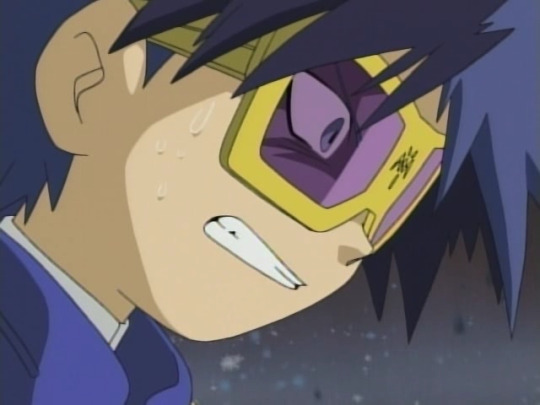
Ken’s journey of redemption is generally well-documented overall, and it was explicit enough in the series that there’s only so much you really need to explain it, but due to the blurred boundary of what was supernatural influence from the Dark Seed and what was Ken’s own emotional problems wreaking havoc, it’s somewhat more difficult to bridge that gap between the Kaiser and Ken, and how they can be the same person.
The easiest way to understand it comes from both directions. One is that Ken, even in his normal element, is much more assertive than he’s often given credit for -- it’s just that the Kaiser is a (fragile) manifestation of that very carefully cultivated to channel that in all of the wrong directions. The other has to do with the fact that the Kaiser is actually really terrible at being a villain, and the persona itself is very fragile and difficult for him to maintain.
Rewatching the first half of 02 shows multiple indications that, for all he seemed to be the stereotype “evil genius”, Ken was forcing himself into the mold. He was never cut out for it from day one. Even from the beginning, Ken’s actual nature as a lonely and inherently kind eleven-year-old child was tearing apart at the Kaiser persona, and the fateful episode 21 was not so much a single turning point for him as much as it was the last straw in a series of things tumbling down for him.
Before we continue: While all of the meta on this blog is only possible thanks to support and input from a handful of friends (whose names will not be disclosed on account of privacy requests), this one in particular arose from a long and extensive discussion with said friends that I am extremely grateful for. As always, I hope I was able to convey your points well.
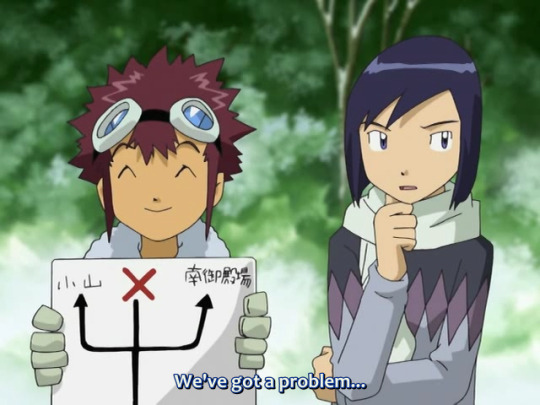
Well, firstly, it’s important to understand that, much like nearly any other character in this series, Ken’s surface demeanor is a bit deceptive. The Crest of Kindness has the original Japanese name of yasashisa (優しさ), which has a secondary meaning of “gentleness” (lost in translation, but still apparent with the bubble metaphor in 02 episode 23). That also ties into the secondary meaning of “kind” -- it’s not just about being naturally “soft”, but actively choosing to be gentle with others even when you’re theoretically capable of not doing so. (For those of you who have seen Appmon, the entire point of that series was about what it means to consciously and deliberately choose to be kind, and, in fact, quite a few parallels could be made between Ken and Haru...)
The contrast between Daisuke and Ken goes far beyond just the surface. Daisuke’s surface demeanor is abrasive, but he’s not actually very good at being assertive until push comes to shove, and he otherwise tends to bend easily to others or get overwhelmed; in contrast, Ken has a more polite demeanor and for the most part seems non-confrontational, but has much stronger control of his emotions and is more easily able to be assertive than Daisuke is. (Of course, both of them share the common point of being like-minded when it’s something that really matters, but Ken is much better at imposing his will and getting what he wants done before Daisuke ever gets to that point, which is what fuels the whole punchline of Daisuke and Ken’s Shopping Carol.)
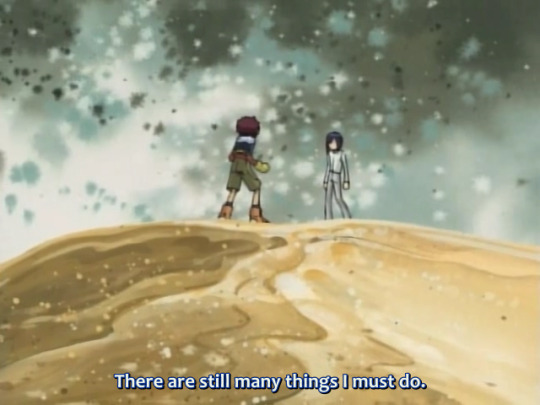
So, the point is: Daisuke is kind out of instinct and just “naturally” being so, but Ken is kind because he consciously believes in treating others well and not causing conflict, and not causing pain to others.
That’s not to say that Ken’s behavior is out of suppression or anything! It’s not a case like Takeru, who’s trying to push complicated emotions down while pretending they’re not boiling under the surface, nor is he like Hikari, who’s compulsively pressing her emotions down out of a desire not to burden others. Rather, even as early as 02 episode 26, he’s very straightforward about what his issue is and what he thinks about it. Ken’s “shyness” during the latter half of 02 is largely due to shame and hesitation from not knowing the other 02 kids well, but as the series goes on and as we go into post-02 material, he indicates that he’s perfectly wiling to be vocal about what he thinks without necessarily fighting any compulsion to suppress it. For someone who claims he doesn’t know much about his own heart, he arguably seems to have the best grip on understanding himself compared to a lot of this cast!
So in essence, the main take-home here is that Ken is theoretically capable of being strong-willed and assertive, and is very good at choosing when he wants to be assertive and when he wants to hold back. And he likes seeing people get along, and he wants everyone to be happy, and he doesn’t like seeing people be hurt or hurting others, and under normal circumstances, Ken has very good control of his emotions for the most part and quite a lot of self-awareness. That’s why Ken is the one to get the unique designation of this Crest; everyone in this cast can be said to be generous and supportive of others in some form, but there’s a difference between being a “natural” doormat who defers to others by default (Daisuke being a very good indicator of how this kind of mentality has a flip side of lack of self-esteem and high insecurity, and Tamers’s Takato being a good indication of how “being deferential” doesn’t necessarily preclude you from having tendencies towards selfishness or cowardice), versus choosing to be kind by understanding everything and still being gentle out of a belief that it’s the right thing to do (again: see Shinkai Haru). And it’s why Wormmon says in the 02 episode 23 flashback that Ken’s kindness can be used against him; being “kind” in this way requires a lot of mental fortitude, strength, and guts, all of which are things that could easily be very bad things when applied in the wrong direction.
This means that all the Dark Seed really needed to do in order to turn him into the Kaiser...was make him lose grip on that self-control.
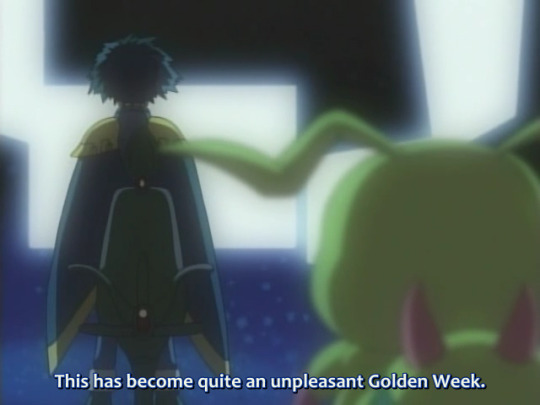
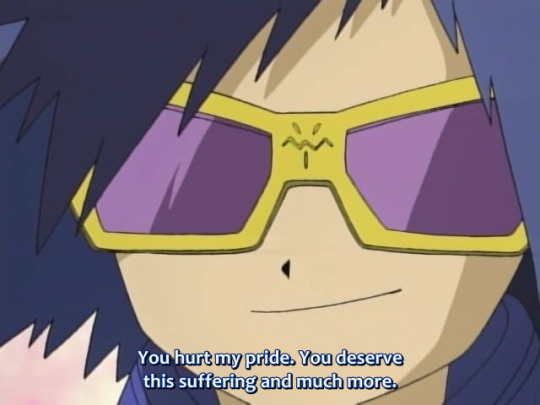
Actually, Ken says it himself in less-than-subtle words in Spring 2003:
…It was revenge. But who was this revenge against? Did I want to triumph over the ones who made fun of me? The ones who looked down on me and used me? But… In the end, it was revenge against myself. I couldn’t do anything but deny the kind of human being that I was.
So in other words, the Kaiser persona was, effectively, a self-loathing eleven-year-old boy throwing a massive tantrum. A lot of the Kaiser’s actions in the first half of 02 are honestly rather petty -- he’s basically upset at the kids spoiling his holiday in 02 episode 6, he attempts torturing Daisuke out of a petty grudge over a soccer sliding tackle in 02 episode 8, and everything to do with expanding his territory and eventually (hopefully?) becoming ruler of the Digital World is frankly very sloppy. For all he’s said to be a genius, his genius only seems to extend to book smarts, and his “tactical planning abilities” never really expand beyond that of a soccer field sort of affair; his way of locking down control on other things is basically just “brainwash it harder” or “whip it harder” and applying harder brute force instead of doing something in the long-term like, say, trying to rule with charisma and recruiting allies.
(Again, bringing Appmon back into this, seeing Cloud in action will give you a much better example of a charismatic human villain who’s actually competent at his job. Or, heck, you can even look back at Savers’s Kurata, who at least was savvy enough to pull strings with people in powerful positions. Or even the Kaiser’s predecessor Saiba Neo from V-Tamer, who may have been openly sadistic but still had the sense to align himself with background power. Really, compared to all of these folks, the Kaiser is downright pathetic.)
Remembering that Ken fell into the Kaiser persona partially as a desperate attempt to become a “perfect person” like Osamu, Ken “imitated” Osamu’s cruelty to him because he felt that was how he could improve himself to become a “strong” person better than him. But the irony here is that Osamu’s “cruelty” was something that he himself never liked, and mainly came from lashing out at Ken due to feeling like he had a lack of control over his own life. So Osamu was never happy in that position, and Ken, who is indirectly pointed out via the bubble metaphor to be even more fundamentally inclined towards gentleness, is probably even more miserable.
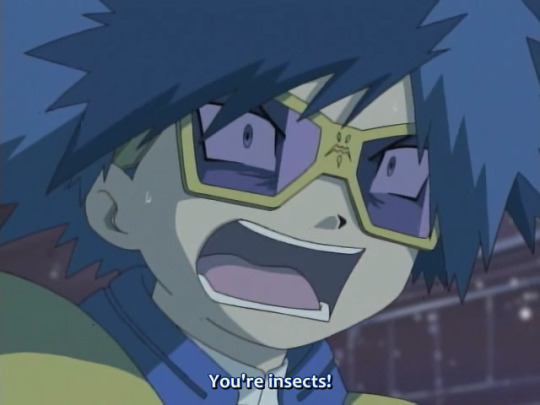

Because everything Ken does as the Kaiser is “unfocused lashing out at everyone”, the Kaiser has less control over his emotions than Ken normally would. Takeru manages to emotionally pin him to a corner by confronting him with enough assertion in 02 episode 19 (this is before he punches him), and correctly points out that the Kaiser isn’t capable of winning with words (i.e. ideologically) and resorts to violence as the first thing he can think of. You’d think that if the Kaiser were actually someone with the self-confidence to consider the other Chosen Children beneath him, he wouldn’t even bother giving them the time of day, but Takeru just happening to be a little assertive is enough to make him lose his composure and start falling apart, and a lot of his shaken “insects!” yelling comes from him seeming pretty desperate to cling onto that rather than being all that confident about his natural superiority over anyone. 02 episode 20 establishes that he’s getting himself in over his head by tampering with the powers of darkness he can’t control, and while, on a plot level, it means that he’s misjudged his own capabilities, on a metaphorical level, it corresponds to the fact that even Ken himself is incapable of getting himself out of the emotional abyss he’s in.
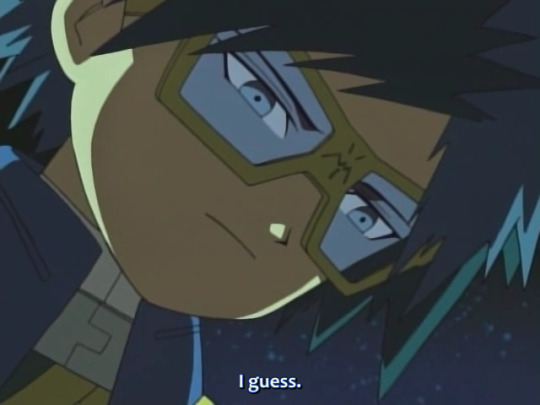
And on the flip side, one of the biggest “tells” that Ken is still miserable during all of this is 02 episode 9, where he’s seen ruminating on the “glory” he’s getting in the real world despite having just decided to leave it all behind. The episode prior, after all, had been called “The Digimon Kaiser’s Loneliness”. The media is using him like some kind of “hot topic”, his parents’ affection (in his mind) is shallow and based only on his achievements, and he has no friends (how much of a role Akiyama Ryou played in his childhood is unclear, but either way, he’s no longer around now). With no emotional support coming from any direction in the real world, he’s resorting to at least trying to have some “fun” in what he perceives to be a “game”, and yet he’s still not having fun at all.
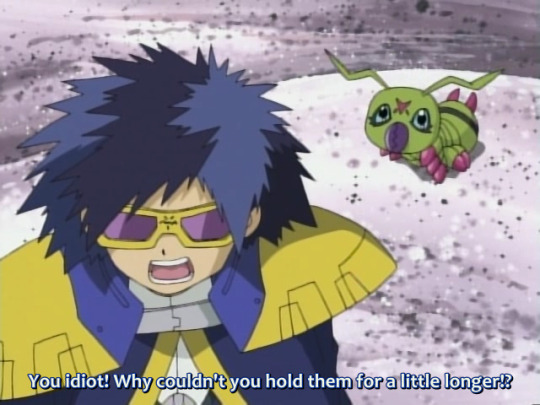
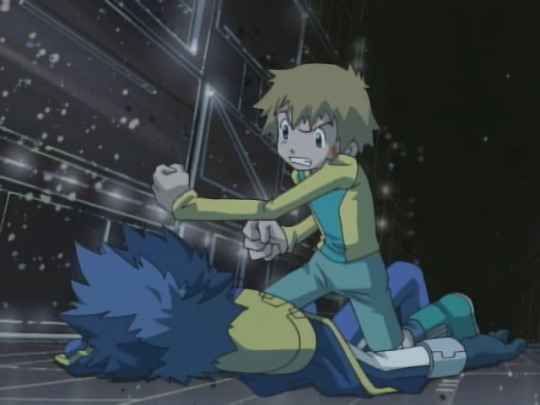
If you look carefully at a lot of the Kaiser’s actions during the first half of the series, one thing you’ll notice is that there are multiple indications that he’s not quite up to par to being as sadistic as you’d think he’d be. Recalling that we learn in 02 episodes 20-21 that the Kaiser is under the impression that the Digital World is like a game that he can “reset” and the Digimon in it not real living beings, it has interesting implications of the fact that he’s actually very hesitant to physically harm other human beings -- he certainly likes emotionally toying with them, but even when he’s trying to take petty revenge on Daisuke in 02 episode 8, he goes out of his way to set up a trap with Bakemon to torture him rather than, well, actually using the kids as hostages. That’s a hell of a lot of work to do, but he instead uses this extremely roundabout way to get them out of the picture in a somewhat less harmful way, risking having them escape (which is exactly what happens).
And in 02 episode 19, when Takeru confronts him and he ends up whipping him, you can hear a slight “...gh?” in the Japanese audio for a split second right after that, meaning that the Kaiser is, for some reason, having a hard time dealing with the fact that he just hit Takeru, and he does a very poor job defending himself against Takeru punching him out despite ostensibly being trained in judo. (Seriously, if you watch the animation of the scene, he’s just lying there while Takeru repeatedly punches the hell out of him, because he’s so out of it.) Regarding the Digimon, he’s convinced himself that they’re not living beings, but regarding the human Chosen Children, who undeniably are, no matter how much he might look down on them, he has a suspiciously hard time harming them as much as he could...
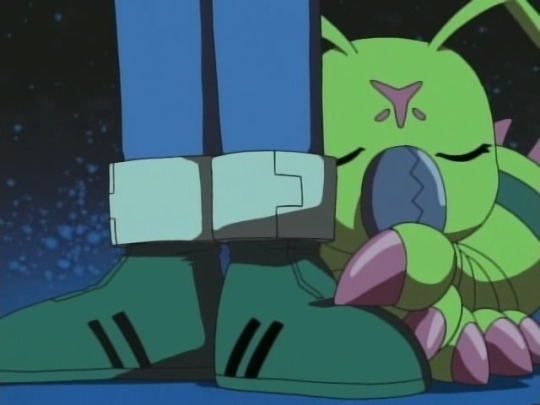
On top of that, one interesting question that might come up to one rewatching the first half of 02 is the strange “contradiction” of why the Kaiser ostensibly seems to hate Wormmon so much, calling him an unworthy idea of a partner in 02 episodes 10 and 19, and yet does remarkably little to get Wormmon away from him or off his case (he hates Wormmon calling him “Ken-chan”, yet doesn’t really try very hard to stop him). He could have easily locked Wormmon away in a cage or something if he really wanted to -- actually, there’s the question, why doesn’t he slap an Evil Ring on him? Because in the end, Wormmon is the only emotional support he’s really getting, and so it’s likely he unconsciously doesn’t want to lose that. Recalling that Digimon are fundamentally linked to the inner self, the Kaiser rejecting Wormmon for being “weak” is analogous to Ken rejecting his own self for being “weak” and “not perfect” -- which means that the fact he still keeps Wormmon around is analogous to the fact that Ken hasn’t really been able to bring himself to completely let his fundamental nature go. And, hence, it’s why he gets so initially incensed at Wormmon’s “betrayal” at 02 episode 10 (and yet still keeps him around despite that), and is ultimately emotionally destroyed by his death in 02 episode 21.
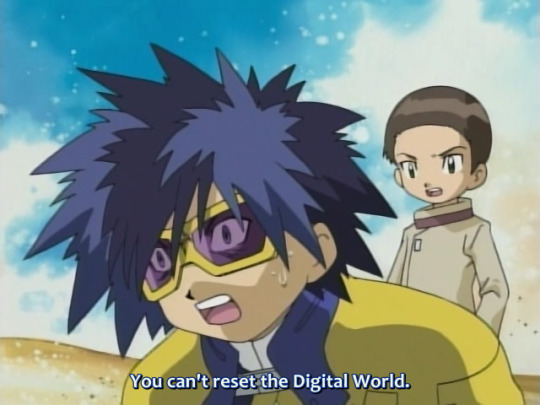
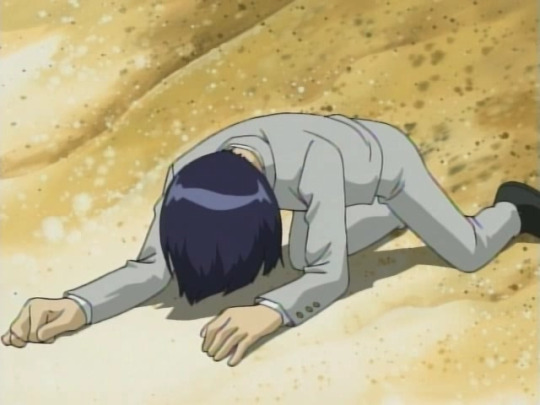
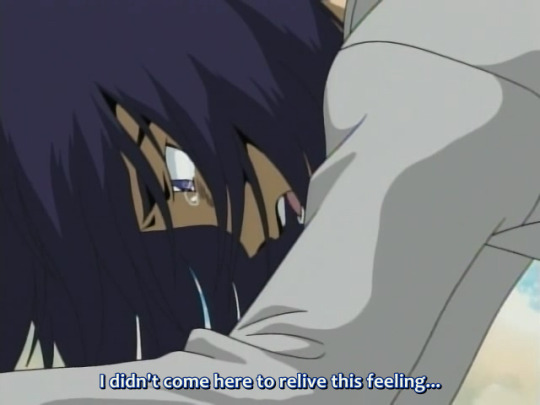
Although, actually, if you look carefully at 02 episode 21, it’s not quite Wormmon’s death that necessarily does it -- the turning point where he sheds the Kaiser persona is right before that (and in case you have any doubts, the animation puts highlights in his eyes for the first time in the series right at that point). Wormmon’s death is the first major consequence of his actions that he has to deal with, but what actually brought Ken back to his senses was his own realization that Digimon are living beings, that his actions have had permanent effects this whole time, and that he can’t take back anything he’d done.
Remember that 02 is a series that is largely about moving on and accepting that you can’t change the past, and that you have to move forward regardless of that. Ken’s fall into sadism was only possible by driving him into extremely deep-seated denial -- he was already starting to face the potential reality of Digimon being real, existing beings in the real world an episode prior. He says, outright, in 02 episode 21, that part of the reason he came to the Digital World to do all of this was escapism -- and, presumably, under the idea that any mistake he made could be rolled back and redone, unlike Osamu’s death. But the Digital World is not a place you can reset like a game, Ken will have to live with the consequences of his actions again, and moreover, every single one of the actions he’d been convincing himself were relatively meaningless had caused severe and permanent harm, and the entire thing overwhelms him.
It’s also important to point out that this was probably where the Dark Seed had to work a lot of magic to get Ken to embrace this kind of denial so easily -- after all, it’s established in the final quarter of the series that it does have a tangible impact on personality and puts a damper on one’s ability to feel empathy. In the flashback in 02 episode 23, regardless of whether Ken considered the Digital World to be a “game” or “able to be reversed” or not, he clearly still didn’t care and treated those around him with proper kindness (even if he did consider it to be all of that, it probably wouldn’t have been entirely unlike how a lot of us have a hard time picking rude choices in video games). It’s a very complicated chain reaction of events that allowed this to be even possible, and it was so against his fundamental nature that once the denial broke and Ken reached his limit, he wasn’t able to do it anymore. The Chosen Children’s main role in 02 episode 21 was really just cleaning up the massive mess he’d made in the form of Chimeramon, but as far as the whole thing about the Kaiser’s persona completely falling apart and Ken being forced to confront his own self goes, that was pretty much all Ken and Wormmon, in a series of dominoes that had already been collapsing for episodes on end.
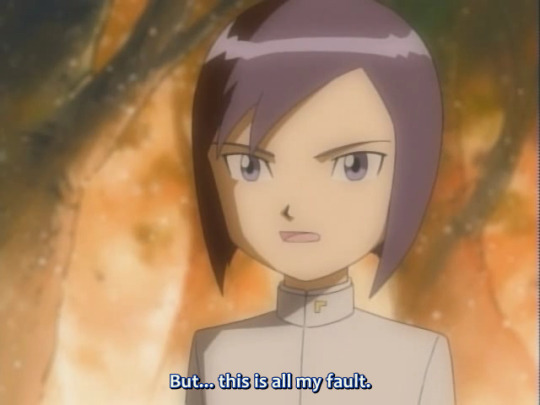
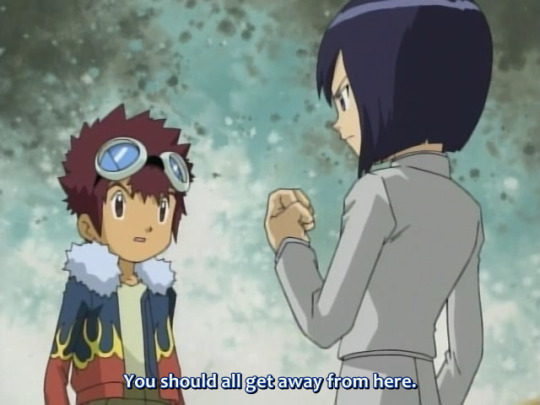
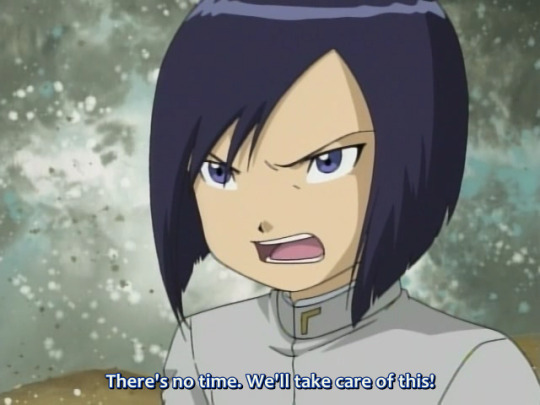
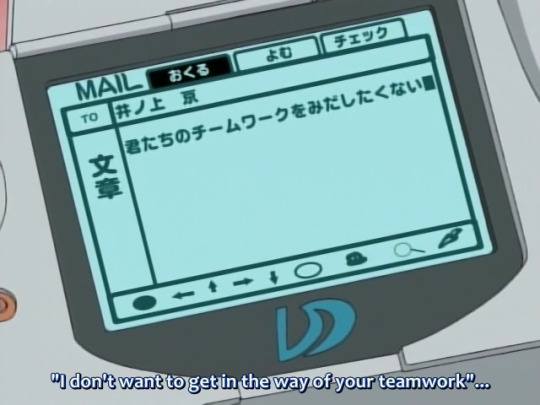
The following episodes have Ken treat the 02 team with a certain amount of detachment, and this is often construed by a handful of people as being reflective of Ken being standoffish of some sort. The fact that Daisuke and Ken are often promoted in franchise materials as “rivals” mainly due to them being in the “protagonist and right-hand-man” position such characters are in might tempt you to think that way, but they are most definitely not!! (Considering that even saying that Taichi and Yamato fit that mold is a bit questionable, and neither Ruki nor Jian quite fulfill the expectations of the role in regards to the genre-subverting Tamers, Frontier, which is explicitly said to be deliberately written to be conventional, is probably the first proper execution of this trope in the form of Takuya and Kouji.) Ken’s detachment from the group at this time in the series is something he actually gives the reason for quite directly: he believes it’s his fault and doesn’t want to burden them with what he considers to be his job, and in the end Daisuke ultimately breaks through to him and they become completely normal friends who get along. “Rival” what?
Ken is, at worst, distant during this point of the series, but he’s actually very straightforward about what he wants and intends to do; it’s just that he’s being a bit blunt about it because he’s still drowning in his shame and not sure how to approach them. (Also, consider the fact he was rather lacking in friends or a support group before all of this; he doesn’t have a lot of experience in socializing, either.) So he keeps everyone at arm’s length, and the reason he comes off as so standoffish is because he’s so assertive! He directly and bluntly makes some very strong remarks about how he believes everyone else shouldn’t be getting involved! Again, when left to his own devices and not being manipulated into by a supernatural evil seed into multiple levels of denial, Ken is very in control of what he wants and thinks, and is even very open about speaking his mind.
That’s even when they’re not good decisions, mind you. Ken starts off the climax of 02 episode 26 being very firm about wanting to suicidally throw himself into the reactor in order to stop it, and 02 episode 30 has him consider himself a burden to the team after the fallout with Iori and try to stay out of it despite them very badly needing his presence, which Daisuke (of all people!) rightfully calls him out for being childish about. But he also listens to reason very quickly and acknowledges the others’ point very easily, with Daisuke reminding him in 02 episode 26 that his suicidal recklessness is actually pretty self-centered and short-sighted of him, since it’ll prevent him from doing anything else to take responsibility for his actions going forward, and Miyako, uh, slapping him in 02 episode 30. (But he comes quietly right away as if acknowledging his own idiocy, and never holds it against her thereafter.)
Nevertheless, the point is: you can see that this kind of assertiveness is the same kind of assertiveness he had as the Kaiser, just channeled in a different direction and for a different purpose. But as the Kaiser, he was angrily lashing out at anything and everything and stepping on anything he could just so he could have a show of power; once he comes back to his senses, he reserves that force for it being something he consciously believes is the right thing to do (regardless of whether it’s actually the right thing to do or not).
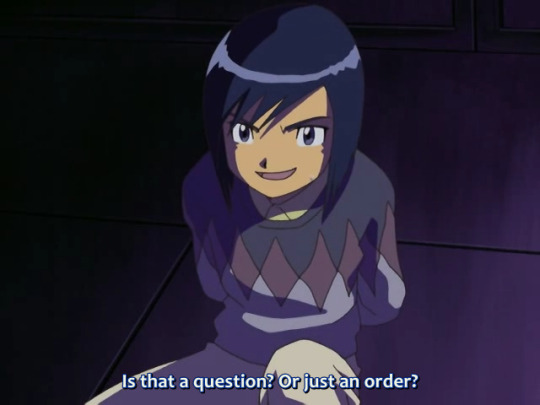
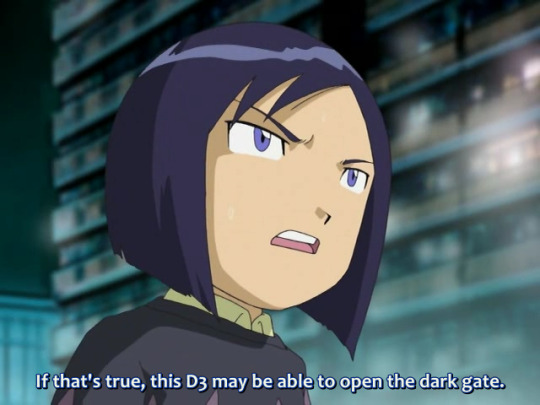
Because of the fact Ken spends a lot of the last quarter of 02 suffering and parsing a lot of trauma, a lot of people have tended to pin him as constantly sad and being a soft crybaby, but that couldn’t be further from the truth! Despite all the emotional pain he goes through, Ken has a hell of a ton of strength through all of this -- he even flings a well-aimed quip at Oikawa in 02 episode 44 despite being in a completely helpless situation, and in 02 episode 45 he himself is the one who volunteers to open the gate to the Dark Ocean, despite knowing exactly what it entails. That takes a lot of guts, and all things considered, his recovery from being the Kaiser spans only four months and is altogether incredibly fast given what he went through -- it did not take long for him to regain his bearings and get himself back on track. Again, it’s the same kind of “assertiveness” and capacity for action that fuels what the Kaiser did, just better controlled and in a direction Ken knows he actually wants.
This is also why I tend to object to insinuations that Ken would be overly touchy about or traumatized by the mere discussion of him being the Kaiser in the aftermath of 02, because the series itself, multiple times, portrayed him as being very able to talk about his experiences bluntly and honestly, at worst maybe considering it a bit of an awkward topic. He has no problems admitting that it was a thing that happened, especially if it involves discussing it as part of taking responsibility or preventing further damage -- it’s just that he of course doesn’t enjoy it either, and is equally as open about the shame he feels as a result. All of the times Ken loses his composure in the latter half of 02 involve either physical pain being inflicted on him, or a lot more actively vicious invocation of his memories and insecurities, and even then he gets himself back on his feet with a rather prompt amount of speed. Poorly timed of a statement as it may have been, Miyako is not incorrect when she says in 02 episode 31 that he has a certain amount of natural resilience that he carried from being the Kaiser.
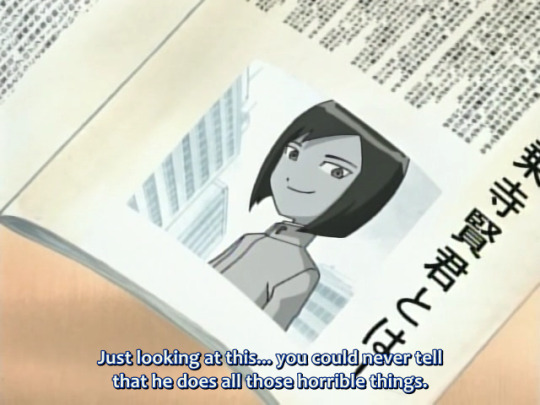
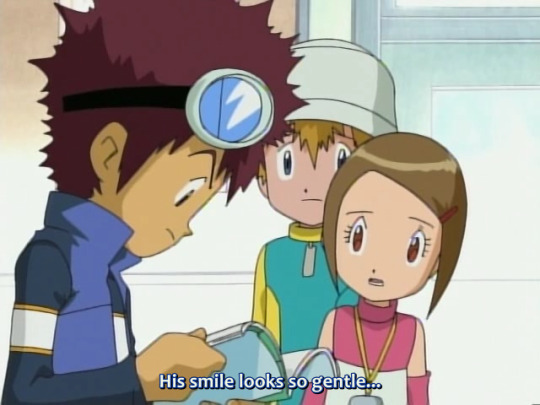
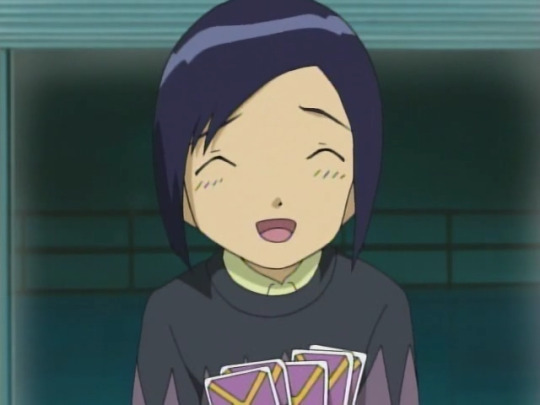
All the way back in 02 episode 9, shortly after it was revealed to the group that Ken was the Kaiser, Iori, Hikari, and Takeru all label Ken as someone who doesn’t look like someone who could do something so horrible, and Hikari even says that his smile looks “gentle” (note that this is yasashisou, a word derived from the same root word used for his Crest). So in other words, even all three of them were able to catch on to his actual nature betraying himself even during that awful period of time. It’s still poking through, all things considered.
But we as the audience know he’s putting on that face for the camera, and his eyes are still as dead-eyed as they are for the first half of the series, and when Miyako accidentally makes him laugh during the Christmas party in 02 episode 38, it’s very much framed as probably the first time Ken has been this genuinely happy in a long while. He was never able to be this happy even when “satisfying” himself by stepping on others as the Kaiser.
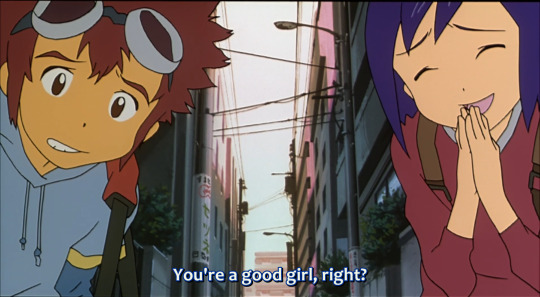

And that’s why it’s so extremely unlikely that Ken will ever be able to lapse back into the Kaiser persona after the events of 02, even with the Dark Seed technically still inside his neck. He wasn’t enjoying it anyway; the Kaiser persona wasn’t a habit that he fell into out of emotional suppression or even catharsis, but rather him forcing himself into a role he was never comfortable in to begin with. He was never truly satisfied with anything he was getting out of it, and moreover, it took the combination of supernatural influence and a hell of a lot of denial to allow it to get that far in the first place, because of how far against his fundamental nature that was. (Again, for those of you who have seen Appmon: think about what it would take to get Haru to embrace sadism.) Even Osamu wasn’t enjoying being cold; being kind and living your life with positivity is a lot more fulfilling and fun, anyway.
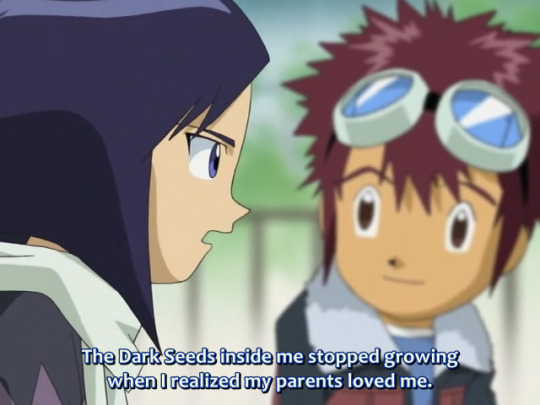
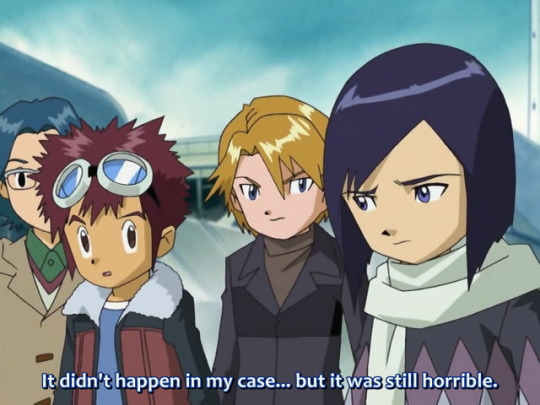

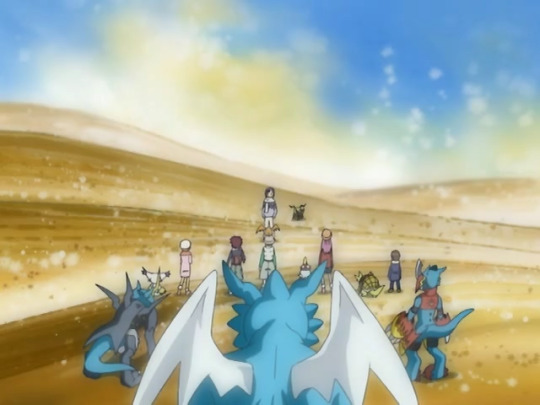
In 02 episode 48, Ken describes the influence of the Seed as “horrible” in retrospect; even if it didn’t involve physical pain and exhaustion the way it did for the Dark Seed children, the entire experience sucked even back then. And while Ken theorizes about the Dark Seed’s influence being countered by the power of love earlier in the episode, when you look at the whole of 02, it’s not just his family’s love -- Ken now has the emotional support of his family, and Wormmon, and his newfound friends, and that’s giving him all of the fulfillment he wanted that putting on a front of sadism wasn’t giving him, and he doesn’t really need anything else anymore.
02 itself is very much about the fact that it’s not a bad thing to rely on the support of others to be happy; the Ken and Kaiser are undoubtedly the same person, but the latter’s existence requires a very specific lineup of events and factors to happen, and one of the massive parts behind that was a severe lack of emotional support or anyone who properly understood him. And by the end of the series, Ken has more than enough strength of heart to accept everything that’s happened and move on, and to stop reaching out to denial and clinging onto the past, and he has emotional support and understanding from a whole new group of friends that thoroughly understand everything he did and went through, and wholeheartedly accept and love him anyway.
He is never going to have a gaping hole in his life like that again.
172 notes
·
View notes
Note
Hi Minnie! Hope you can help me settle an argument my brother and I are having about EG!Steve. I'd love to hear your thoughts about this with shipping goggles off, looking at it purely in terms of characterization, narrative, and good writing. Better hang on though, it's going to be a long ask! (sorry in advance for spamming you!) 1/7
So my brother and I were watching FatWS and once again got into a debate about whether Steve's last actions were a disservice or in line with his characterization and narrative, given that the Russos confirmed (and therefore it's Word of God/canon, even if it did sound reactionary to the immediate backlash after EG) that Steve created an alternate reality when he went back, and didn't just live in hiding in the past of the OG timeline. 2/7
Because of this, my bro argued that: 1) the total character assassination that is the idea of Steve just sitting back and letting all the shit happen happen is no longer a problem - for all we know, the alternate reality oldman!Steve came from might have become utopic already due to his presence and foresight. He played coy when talking to Sam so we don't know for certain he didn't save Bucky, get rid of Hydra, and enact social reform when he had the chance. 3/7
Likewise, 2) the accusation that Steve would rob Peggy of her husband and children is a non-issue as Steve went back to a time before Peggy and Daniel got together - I argued here that it was still wrong for him to do given that he KNEW for a fact that Peggy lived a happy life, whereas it was a gamble if he could give her the same. My bro shot back when you truly loved someone, you want them to be happy and to have what's best for them. 4/7
So if Steve chose to go back to Peggy, he had to have believed that he could give her the best life. That Steve based that decision purely on his own assessment is pretty in character (e.g. pushing to become a soldier because he thought that was how he could do his part, even though at the time, he'd have just been a danger to himself and other soldiers; not signing the Accords because he believed in his team's judgment in crises above gov't oversight that might be influenced by politics). 5/7
And lastly 3) he might have settled into the past and started to move on, but what was wrong with him choosing to be selfish and going to the past when given a chance? Why was it wrong for him to go back to a time he knew, where he was beloved by both Peggy and the public, and when he could also save Bucky early? In terms of character growth, wouldn't it be fair for him to finally learn he could be a bit selfish and choose happiness, after a lifetime of nearly suicidal selflessness? 6/7
Our debate was based on confirmed canon with shipping put aside. So I put forth the sin of leaving a traumatized Bucky, Sam, and world behind, that Steve's actions were surely the result of a man broken by grief again and again, and that choosing the past was him running away - which, I argued, was a horrible way to end his character arc. But my brother asked me why I thought so, because wasn't this the so-called 'soft epilogue' that Steve deserved, one that was most in line with canon? 7/7
***************
Hey love! Very interesting argument you and your brother are having here… I’m sure he’s a great guy but I have to say that I vehemently disagree with him (as you probably already guessed lol). Soooo many people have done an excellent job at explaining why, shipping aside, Steve’s ending in EG was absolute bollocks, and I’m certain I could never argue this case as well as all of them have. Nevertheless, I’ll do my best to explain why, in my opinion, your brother is wrong :p I’m going to put my reply under the keep reading tag, because it is long.
1. The Russos and Markus & McFeely (the writers) never managed to agree on whether Steve really did go back to an alternate timeline, and if so, how that would have worked, exactly. When they were asked, after EG had been released, about whether Steve would have just sat back and let everything he knew was happening/going to happen in the decades to come, both to Bucky and to the world at large, they came up with this ‘alternate timeline’ solution, but they kept contradicting each other on the logistics and technicalities of it (like how would old man Steve suddenly be able to jump timelines to come back to give Sam the shield in EG? And how did EG Steve attend Peggy’s funeral, like they also suggested, which would technically have been in a different timeline?). Which makes it pretty clear that this wasn’t something they’d considered beforehand or even all agree on afterwards, and therefore it can’t technically allowed to play a role in judging the rightness of Steve’s ending in EG if we’re looking at it from a ‘the creator’s word is law’ perspective. Moreover, there is nothing to indicate in EG itself that Steve knew he’d be able to create alternate timelines, so that would’ve been a crazy gamble on his part. Also, him ‘playing coy’ in that final scene with Sam really isn’t a convincing indication that he was actually, canonically, talking about anything besides marrying Peggy.
2. Which bring us to point two: Peggy had literally told Steve she’d lived a happy life with her family, and told him in no uncertain terms to move on. If Steve really loved her, he would have accepted her wishes and allowed her the dignity of her choice (something Peggy herself, in CA:TFA, had told Steve was important to do when you care about someone) to move on from him once she believed him dead. Steve deciding that he would be better for Peggy because he believed was a better man than the person she ended up marrying originally would be the most un-like Steve thing to do, ever. Steve has never once shown that he thinks of himself as the hero or better than other people – he simply wants to do the best he can to help make the world a better place. He would never say “Peggy deserves the best and I believe I am the best, therefore she will have me, regardless of what she thinks or wants.” Steve drinks respect women juice, that’s clear from all of his movies, and deciding the course of her entire life for her, taking away her agency, whether in his own timeline or another, would be utterly disrespectful to Peggy.
3. As for the next point: of course there’s nothing wrong with Steve being selfish for once – Steve is human, and all humans are selfish sometimes, and that’s okay. But, as Chris Evans already explained multiple times prior to Endgame, Steve had already made selfish decisions in the past, namely when it came to getting Bucky back and keeping him safe. Shipping aside, Bucky was presented in all the Cap movies as Steve’s very best friend, and was even called his ‘soulmate’ (platonically or otherwise) by M&M (the writers). So when, in Civil War, Steve was presented with a choice between duty/what was expected of him by the government versus saving Bucky/keeping Bucky safe, Steve was selfish and chose Bucky. That, canonically, made sense. Peggy being presented as the ultimate love of Steve’s life, who he loved and valued more than anyone or anything else in the world (which is what happened in EG), canonically does not make sense.
In CA:TWS, Peggy told Steve to move on. When Peggy died, Steve buried her and mourned her, and then not long after, he canonically kissed Peggy’s niece. Then, in Infinity War, Steve saw Bucky turn to dust before his very eyes in the “Blip” (a conscious decision on the writers’/directors’ part to show how Steve once again lost what was most important to him while helplessly standing by) – and the next thing we know, Steve is leading a support group for other people who lost loved ones in the Blip, and starts talking about losing… Peggy? Huh. Also, Steve going back to a time which your brother calls “a time when he was beloved the public” doesn’t add up, either: technically, Steve went back to a time where people loved an idea of him, but also believed him to be dead. So either he would have had to have found a way to convincingly stage his own resurrection (meanwhile possibly leaving the other version to vegetate in the ice..? depending on how this timeline malarkey was supposed to work), or he would have lived his whole life hidden behind some fake persona – which does not sound like Steve at all, does it?
4. Finally, let’s talk about Bucky some more, because I think we need to to be able to assess the situation properly. I understand that your brother may believe that shippers are often delusional and only see what they want to see etc, but there is ample evidence, canonically, of Bucky being the most important person in Steve’s life – the person he would give up the shield for, the person he would give up his other friendships for, the person he would give up his life for. Peggy may have been a recurring character in character in the three Cap movies, but she was never presented as the principal motivator of his actions, or as the love of Steve’s life. You know who was? Bucky. Sure, that love wasn’t canonically romantic in nature, but there can’t be any doubt that Bucky meant more than anything to Steve. Therefore, Steve choosing to have a ‘soft epilogue’ that entails him spending the rest of his life without Bucky – and, more importantly, Bucky to spend the rest of his life without Steve – contradicts everything we’ve learned about their relationship (platonic or otherwise) in the rest of the movies, does it not?
Also, the Russos have said something to the effect that Bucky and Steve were now both mentally ‘well enough’ to not ‘need’ each other anymore (because as we all know, that’s exactly how friendships work…), but it’s pretty clear from EG that Steve was still traumatized by everything he’d been through, and going back to the 50s would have meant he would never be able to get proper help with that and in fact could only talk about any of it with Peggy and Peggy alone. Moreover, M&M have literally said in interviews that Bucky wasn’t all that well yet, mentally, and TFAWTS also shows convincingly that Bucky was not actually in a good place when Steve left him. So that would have meant that Steve either did not see this (unlikely, given how close they were) or did not care (unlikely, given how close they were).
It would have meant that for the first time in all these movies, Steve decided “to hell with Bucky’s needs, I’m gonna just be selfish because I’ve earned it and claim my trophy wife because actually I am the best man for her, despite the fact that she’s already lived a happy life that I will be negating against her wishes, but that’s fine because maybe I’ll be able to create a different timeline, and maybe I’ll be able to save Bucky from all his trauma anyway, but then again maybe not, but that brings me back to my first point of to hell with Bucky’s needs” - which does not make a lot of sense to me, personally. Not to mention that, in exchange for his ‘soft epilogue’, Steve would also leave the world to sort out the post-Blip mess without him, and leave all the other friends he still had left and clearly cared about a lot to boot. I would not call that character growth, I would call that character disintegration. If your brother insists on taking the creator’s word as gospel and that we have to accept that Steve really did do what he did at the end of Endgame, and that wasn’t just a case of bad, lazy writing fuelled by greed, then to make a decision like this, Steve would have been either an asshole in disguise all along, or mentally extremely unstable.
There you have it, my two cents! I hope this helps a little in settling the argument with your brother, anon! Lots of love ❤️
127 notes
·
View notes
Text
Yaoyorozu, Hawks, Bakugou, Amajiki, Dabi, Mirko & Geten with a Genderfluid S/O:
If you want any characters adding here or to anything else I write, just drop me a comment or an ask!
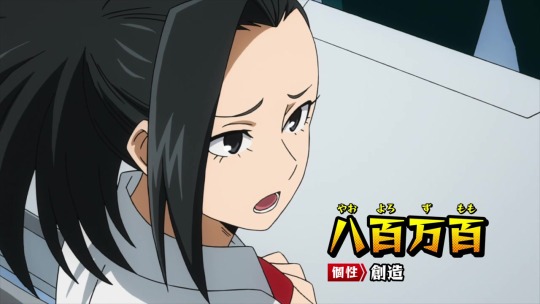
Momo Yaoyorozu:
☿ It was hard enough for you to acknowledge your own gender- fully understanding it was a different topic - so coming out to Momo was going to be tough.
☿ Really tough.
☿ She was a lovely girl and a wonderful girlfriend.
☿ But could you really expect her to be supportive of something so complex?
☿ Your gender fluctuated a lot - sometimes you'd feel distinctly outside the binary, and sometimes you'd feel more masculine, or more feminine.
☿ You hadn't noticed this until recently; you rarely gave gender a second thought.
☿ Looking at yourself in the mirror and questioning everything that felt a little off, you'd figured that maybe you just wanted to feel special, a little different.
☿ So you researched. A lot.
☿ You had a system that no-one understood because you were still deep in the closet: a different coloured strand/extension in your hair (on one side only) that stood out but was never questioned.
☿ Red = Feminine, Purple = Non-Binary, Blue = Masculine, Green = Third Gender/Multigender.
☿ Coming out was a decision you spent countless nights debating.
☿ No-one 'deserved' to know, it was really nobody's business…but being gendered correctly 100% of the time did sound nice.
☿ Deep breaths, and positive thoughts.
☿ "I identify as…no, I am genderfluid. You, eh…you should probably know that."
☿ This sweet, precious thing was confused at first.
☿ But you explained it:
☿ "Sometimes I'll feel more masculine, more like a boy, sometimes feminine, neither or both/all genders? I'm still wrapping my head around it too, but eh…it can change a lot. Sometimes a few times a day. Um…sometimes one gender will stick for a while. That's why figuring it out can be…confusing. But it's also enlightening, uh…kinda nice, warm, y'know?"
☿ Instantly says she understands and supports you.
☿ Expect a flurry of hugs and kisses.
☿ Acts like a very proud girlfriend.
☿ Pays extra attention to your hair - never wants to get anything wrong.
☿ If she does, she'll apologise immediately and reprimand herself.
☿ Go easy on her, she'll be an utter mess.
☿ Overall, her love for you is unconditional, and she makes sure that you know she's sorry.
"You shouldn't ever have to be scared to explain who you are."

Keigo Takami/Hawks:
☿ Keigo knew something was amiss.
☿ You'd been dating for two years, and although he never pried, he couldn’t help noticing the way you'd suddenly become uncomfortable when someone addressed you, or when you stayed in one set of clothes for too long.
☿ It wasn’t always the same, and he just figured it was anxiety and general insecurities coming to the surface.
☿ So he held you closer, wrapped you in his wings and fussed over you for hours (or however long his job would allow).
☿ He didn’t have a lot of time to consult the internet.
☿ He also didn’t want to pressure you into revealing anything.
☿ But now, the topic was unavoidable.
☿ You'd broken down, crying and mumbling to yourself when you thought he couldn’t hear you.
☿ He finds you kneeling in front of the full-length mirror in the bedroom.
☿ Rushes to your side in an instant.
☿ "What did the mirror do to you, dove?"
☿ Very, very worried, feathers shaking around you.
☿ Defensive birb, ready to protect you from that loathsome mirror.
☿ "I-I look so…so girly today! It's awful! My chest, and…and…I don’t have a binder, and I…"
☿ Doesn't understand, but is determined not to worsen your mood.
☿ "Hey, look at me. What are binders, and where would we get one?"
☿ He places both hands on your cheeks, and you lean into him.
☿ "They're…they flatten your chest, um…sports bras and binders…I-I've never bought one, so I don’t know…"
☿ He nods. "Do you wanna come with me to look for one?"
☿ You're perplexed - shouldn’t he be weirded out by this?
☿ He laughs, and somehow, it warms your heart. "I just want you to be happy. I'd do anything to make that happen, angel. You might need to explain all this to me, though. I'm a newbie, after all."
☿ He takes physical notes - nothing will catch this man out.
☿ If someone misgenders you, he'll correct them immediately.
☿ If someone acts ignorant or spiteful, he'll 'politely' tell them how to adjust their attitude, and how to address people outside the gender binary.
☿ I.e, respect them even if you don't have a complete grasp on their identity, and never, ever misgender or marginalise them.
"You are yourself, not how others perceive you."

Katsuki Bakugou:
☿ You decided to use pronoun badges. There were some awesome-looking designs out there, and you'd been feeling a little more confident lately. It couldn’t hurt to clue your classmates in, right? Plus, you supposed Katsuki ought to know…he was your boyfriend, after all. He'd definitely be pissed if he discovered this a few years down the line, rage about you not placing enough trust in him, and it'd be a huge mess…
☿ You'd never interrogated him on LGBTQ+ issues, so you weren't sure how he'd take your news; he wasn’t always the most accepting (Midoriya & the quirkless community being obvious testaments to that).
☿ Needless to say, instead of being confused, he was frustrated. Why was he with someone who didn’t even know their correct pronouns? He pointed it out, very matter-of-fact.
☿ When your dazzling smile suddenly dropped, he became concerned. Was he the idiot after all? Why did he upset you? What in the Nine Circles of Hell possessed him to do that?? He didn’t even say anything bad! All he mentioned was…
☿ Oh. Shit.
☿ This boy isn't accustomed to apologising, so don’t expect it to flow naturally. He’ll try, because he loves you, but he won't keep eye contact for very long and he'll recant every few seconds.
☿ This perceived insincerity only masks his guilt, though. He’ll beat himself up for years, unless you stop him. This boy has no chill. He's always the first to go off on people when they disrespect or degrade you, so he's gotta make amends in some way, right?
☿️ Honestly, if there are any pronoun badges with really cool or pretty designs, he'll buy them for you. He'll also get for himself, to prove his acceptance and solidarity. He won't ever allow you to feel alone again. He's more than okay with your identity - it changes absolutely nothing about you. If anything, it gives you a sense of completion. He's here for that, 100%.
☿️ You better believe he'll fight for your rights.
☿️ If there's any hate/intolerance directed at you, he'll explode. Quite literally.
☿️ You'll be tasked with ensuring no-one dies. Unless you want them to, of course.
☿️ They'll deserve it.
☿️ Katsuki is very perceptive, so when he gets to grips with it, he'll most likely notice every indication (however subtle) of a gender change. He'll carry spare pronoun badges around, just in case you lose yours.
☿️ Secretly, he's swimming in pride.
☿️ He's kinda like 'Yeah, that's my awesome partner! Look how cool they are, flaunting their pronouns like that, all confident and happy!'
☿️ This boy adores the ever-loving shit out of you. He hates reflecting on the day you came out, because he handled it so poorly at first. Thankfully now though, you're more secure.
"Gender doesn't matter. I'm gonna be a hero, not a hater."
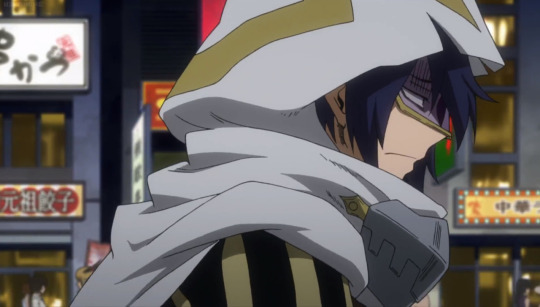
Tamaki Amajiki:
☿️ (Y/n) wasn’t a dead name, but sometimes the very mention of it made your skin crawl.
☿️ It was a gift from your parents, so you wanted to keep it.
☿️ But it was a very gendered name - you couldn’t escape that.
☿️ So you decided on a few more - ones both your mind and heart adored.
☿️ The names corresponded to different gender identities, and although you weren't out just yet (though you planned to be shortly), they gave you the fluffiest feeling.
☿️ Because you hadn't come out, you didn’t bother making it easy for people - no different coloured bracelets, rings or anything to highlight your gender at the time.
☿️ In your heart, you knew who you were.
☿️ Still…everything seemed tied to the binary - official documents, school, the chatter of other students…you'd seen and heard it all.
☿️ These people didn’t accept non-conformists.
☿️ So why should Tamaki?
☿️ Sure, he was kind-hearted, heroic…amazing, but what would he do? What would he say, when you finally came out? You couldn’t remain in the closet forever.
☿️ No way that was happening! You were human too, your feelings mattered! Surely you were allowed to voice your truth…
☿️ Tamaki loved you.
☿️ He'd be accepting…right? Memorising some more names and pronouns shouldn’t be so tricky.
☿️ To minimise discomfort for both of you, you chose to explain things in his room.
☿️ He got really nervous at first - he thought you wanted to break up.
☿️ Boy was sweating profusely, coming up with all sorts of counter-arguments in his head. He really, really loved you.
☿️ "(Y-Y/n)-"
☿️ "Um, could you maybe call me (O/n) today? It's an…off-spectrum day."
☿️ Cue more confusion than Momo.
☿️ He'll ask about it in a really gentle voice - being anxious himself, he can easily pick up on other people's signs.
☿️ "Basically…my gender's fluid, so…you know how 'sex' is biological and 'gender' is a sense of identity? Well, sometimes I align with my birth sex, sometimes I don't. Today is…one of those days."
☿️ He'll hold your hand while he listens, squeezing it periodically to reassure you.
☿️ Now it's your turn to question the strength of your relationship.
☿️ This boy's love is deep, though; he cares way too much to let anything come between you.
☿️ Plus, nothing about you has actually changed.
☿️ You've just come into yourself, gained more comfort in who you are.
☿️ Tells you how proud he is.
☿️ Asks you to let him know when you sense your gender change, so he never calls you by the wrong name or pronouns.
☿️ It's They/Them today, but who knows about tomorrow? Or even an hour from now?
☿️ Finds gender-neutral compliments and nicknames, and does a ton of research.
☿️ Has an entire script in his head - if you want to come out but can't speak for yourself, Tamaki will push aside his anxiety and recite the words he's practiced a million times.
"You've finally found yourself - only change if it feels right."
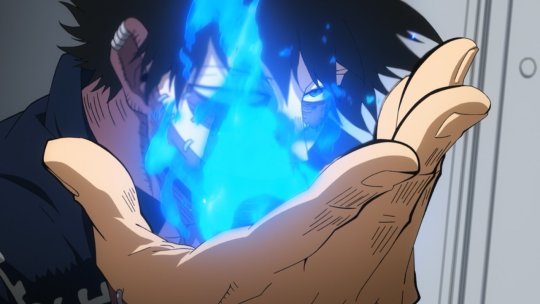
Touya Todoroki/Dabi:
☿️ Your identity was really important and dear to your heart.
☿️ But that didn’t stop those you cared for tearing you apart whenever you tried to speak up.
☿️ Your family, your friends…you loved them, but they just couldn’t accept you.
☿️ So you killed them.
☿️ You went on the run, evading police and heroes alike for years.
☿️ And then, you found the League of Villains - a strange dynamic, kind of like family but much more welcoming.
☿️ Yet, your identity stayed hidden. You didn’t have the strength to harm all these people, if they rejected you.
☿️ Besides, there was more solidarity here than there ever had been with your blood relatives.
☿️ Dabi was your companion, though whether that meant closest friend or love interest, you didn’t know.
☿️ He was observant, transforming his thoughts into words regardless of how that affected people.
☿️ He pointed things out immediately.
☿️ "New bracelet?"
☿️ You paused, half-shocked, half-afraid.
☿️ You knew that he'd see through any lie you posed.
☿️ The truth would be the only thing to save you from his flames.
☿️ "That means something, doesn't it, (Y/n)?"
☿️ Step 1: put the drink down so you don't shatter it in anger.
☿️ "Yeah, um…this colour means 'masculine'. I'm a guy…now."
☿️ His face betrayed nothing.
☿️ "Like a reverse Magne?"
☿️ You wondered if that was a genuine question or an attempt at humour.
☿️ Todorokis don't understand jokes.
☿️ "No…she's a transgender woman, I'm genderfluid. I'm not confined to a single gender. It, uh…it changes."
☿️ His nod didn’t instil you with confidence.
☿️ "You out to the others yet?"
☿️ "Didn't think they'd accept me."
☿️ He made a 'Really? You're the least weird of the bunch' face.
☿️ "Ah, I'll just burn 'em if they don't."
☿️ You were too stunned to employ a comeback.
☿️ He contemplated for a while.
☿️ "So, you got any other names?"
☿️ Helps you plan how to come out to the rest of the League.
☿️ Will legitimately burn the haters.
"Found families are more accepting than the real thing."
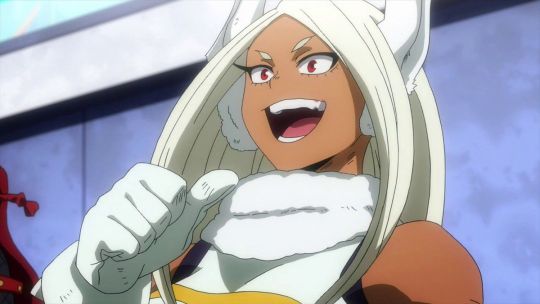
Rumi Usagiyama/Mirko:
☿️ You bought three mugs - 'It's a Girl', 'It's a Boy' and 'It's a Mess'.
☿️ The excitement had been bubbling away inside you for weeks.
☿️ Rumi still didn’t know that you were genderfluid, but she was about to learn.
☿️ There wasn’t a doubt in your mind that she'd accept you.
☿️ You hadn't told her yet because it was a big thing - lots to take in, and you needed to be completely sure of it, and of your relationship.
☿️ You weren't gonna tell just anyone.
☿️ Dating Rumi was awesome, and this was just the next stage.
☿️ It didn’t go according to plan.
☿️ Not at first.
☿️ "You're pregnant?!" Was her very concerned response.
☿️ She kept muttering about how she needed some space to think things over.
☿️ Until you dragged her back, exasperated but determined to explain yourself.
☿️ "It's in reference to myself. I wanted to let you know, in a funny way, that I'm genderfluid. There's a Girl and a Boy one, and the other is for Non-Binary."
☿️ She made a noise like she understood, but you saw the confusion.
☿️ "Today's an Enby day, but you might have a girlfriend tomorrow. Or a boyfriend. Who knows?"
☿️ In an instant, the biggest smile took control of her face, and she brought you into a crushing hug.
☿️ "So I could have a girlfriend, a boyfriend and a murder partner??"
☿️ "Eh…if you can do the jail-time, count me in."
☿️ This one won't necessarily search for information herself, but she will consult you whenever she's having a difficult time processing something.
☿️ You're like,, the expert in all things LGBTQ+, and she loves listening to you talk so passionately.
☿️ She's really glad you told her - that you trusted her with something so important.
☿️ She feels loved, and makes sure you do too.
☿️ Asks if you ever thought she'd reject you.
☿️ "Nah. We'll go strong forever, Rumi."
☿️ She's overjoyed, honestly.
"You're so brave for coming out, and if someone doesn’t like it, I'll kick their butt."
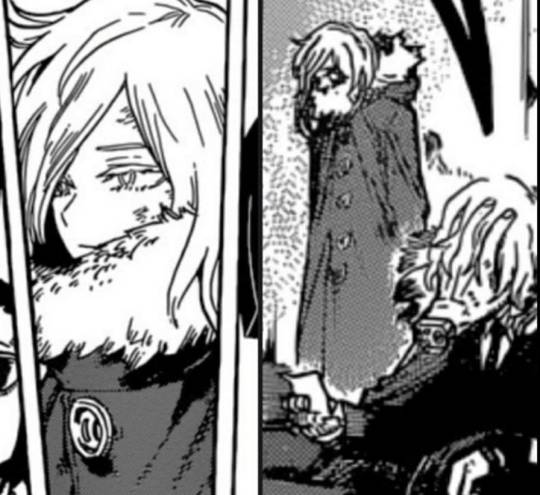
Geten/Iceman:
☿️ Geten didn’t have the faintest clue about gender identities. He accepted male and female, but without a proper education or motivation to learn anything beside his quirk, you didn’t expect him to understand. You would've held it in, if you were strong enough to deal with the constant misgendering.
☿️ If you use Neopronouns, you're especially worried. They aren't as widely welcomed as the general She/He/They. And Geten being the angry, feral gremlin he is, his temper was a major concern.
☿️ You couldn’t change for him, so if he decided to lash out or disapprove, you'd be crushed. You'd obviously have to walk out of the relationship, if he didn’t do so himself. As deeply as your love ran, you simply couldn’t put yourself through such anguish. You weren't of the soundest mind, so to be rejected by Geten…
☿️ He isn't gonna understand unless you sit him down, crack open the slideshow presentation and maybe start crying? He'll feel guilty, but he doesn't ever wanna see you in distress. He said as much, in the beginning of your relationship.
☿️ So cry. Cry your little heart out, and he'll do everything within his power to comfort you. He's not the most receptive to other people's emotions, but with you, it's different. He's always by your side, always watching over you. His hugs are a little stiff, but wrap your arms around him tightly, and he'll protect you with his life.
☿️ "So…genderfluid?"
☿️ His tone is gentle, like he's afraid to cause any more tears.
☿️ "Yeah, um…you identify with your birth sex, right? Well, I don't…not all the time. And if you could…could use those pronouns? That would mean…a lot. To me. It'd mean everything, actually…"
☿️ He's quiet for a while, still trying to make space in his brain for all this new information. It isn't something he needs to 'come around to', though. He'll be completely painful and respectful. He's bound to slip up a few times, but he'll always correct himself.
☿️ Hates seeing you cringe whenever he makes a mistake. Always vows never to let it happen again.
☿️ You're okay though - you know it's gonna take time.
☿️ Angry boi never uses your gender identity as an insult, and openly condemns (threatens) anyone who does. He'll want to prove himself - prove he's gonna love you regardless of gender, regardless of everything!
☿️ Honestly doesn't know why you were so nervous to explain this. When he said his love was unconditional, he wasn’t lying.
“There’s no way I couldn’t accept who you are.”
#my hero academia x genderfluid reader#my hero academia imagines#headcanons#momo x reader#short but I'm having a crisis so it was needed#momo yaoyorozu x genderfluid reader#genderfluid reader#bnha x genderfluid reader#okay so I'm including other characters#keigo takami x genderfluid reader#bnha hawks#hawks x genderfluid reader#tamaki amajiki x genderfluid reader#bnha tamaki#bnha tamaki x reader#tamaki amajiki x reader#bnha dabi#dabi x genderfluid reader#bnha dabi x reader#bnha mirko#mirko x genderfluid reader#geten x reader#geten x genderfluid reader
310 notes
·
View notes
Text
Giftedness is a Spook
I personally think giftedness is a stupid concept. Basically, it’s the idea that certain children, so folks under the age of 18, are “smarter” in some general or abstract sense than others, or more competent, more talented, more skilled, “better thinkers”, whatever. This concept originated pretty much in the 19th and 20th centuries, where we began consolidating under the “intelligence” label and categorizing people based on “how smart” and “how dumb” they are. There is a lot of baggage associated with the term giftedness, a lot of it historical and bigoted, so let’s investigate and such.
The most used definition of giftedness is having an IQ score above 130, or two standard deviations above the mean of 100. Though this historical definition has faced lots of criticism, since it is clearly possible to have superior ability in some domain without having a conventionally high IQ score, such as in the arts, or debating and public speaking, or sports, or chess, or really anything really.
Due to the fact that the “IQ above 130” definition of giftedness falls short of actually capturing all high-achieving children, most modern gifted education programmes no longer use this as the sole indicator of giftedness, and rather adopt a more multidisciplinary approach. Now, most simply look for superior skill or talent in one or more key areas, which can be art, or sports, or leadership, and attempt to cultivate that, as well as looking for people with a generally higher IQ than the average in their age group.
The issue with this approach is that it views giftedness as some sort of intrinsic, fully general, conserved property that is only found in certain sects of the population, and thus categorizes people into “gifted” and “non-gifted”. This categorization falls short in part due to the existence of “twice-exceptional” students, who are gifted in one area, but require unique accommodations in other areas. So it appears that it is possible to be “gifted” and “non-gifted” at the same time, so just how useful is this concept?
What’s more, giftedness often focuses on general cognitive traits, such as gifted children have greater white matter density, or faster information processing speed, or hear sounds faster, or think more critically, but from my perspective, these just seem to be variations in human characteristics, in the same way that some children are taller than others or start puberty earlier than others. Everyone develops at their own pace and there are plenty of people who develop out of the norm, especially since concepts of child development almost always exclude neurodivergent children and their different cognitive and psychosocial milestones.
And they are not necessarily NATURAL or inevitable variations in human characteristics either. All the traits associated with intelligence - information processing speed, critical thinking, white and grey matter density, working memory capacity, creativity, executive functions, enhanced senses - are heavily influenced by societal factors.
For instance, a child that has been well-fed since birth is obviously going to have a more developed brain with a higher capacity for all those things than a child that has suffered chronic hunger. A child that receives nurturing and good parents is going to have a more developed brain a child that receives abusive and neglectful parents. A child that grows up in a war zone is going to be different cognitively and intellectually than a child that grows up in a relatively peaceful location.
And those developmental consequences aren’t always natural in the sense that they are innate, they are artificial, engineered by politicians, corporations, and a society that absolutely refuses to take the suffering of children seriously. Yet the children who have been disadvantaged by this abusive society are unlikely to be categorized as gifted. These children show lower scores on IQ tests and the school system thinks they’re dumb, or worse “average”. These children don’t show superior performance in any particular area, there must be something wrong with them, they’re not “special” like these gifted kids other here. They don’t need special help, they just have to follow the curriculum for the regular or the *gasp* dumb kids, geta 9-to-5 job, and wait 50 years to retire, they won’t be these gifted kids that change the world.
LAME. This is lame. This is the wrong way to think about the differences that exist between children. And what’s worse, it’s so definite and unchanging, as if the traits associated with intelligence cannot be changed. As if we can’t help children with their working memory capacity, or their creativity, or their critical thinking, or their executive functions. As if we can’t help children find something they enjoy and let them cultivate that activity. These are all skills that can be taught, but they aren’t taught at all. We just let the bell curve “form naturally” and then take the kids on the right-half of it and label them “gifted” and then discard the rest, even though we are capable of teaching them those skills.
Giftedness promotes two unhealthy narratives: (1) being average isn’t good enough and (2) being below average is bad. With regards to (1) and (2), it completely ignores all of the facets of a good life, or what can be a good life. In my view, a good life is one that you enjoy and are proud of. Where you have strong relationships with others, actual freedom and control over your life, where you have things that you’re good at or enjoy doing, where you are proud of what you’ve accomplished. It has nothing to do with “having a higher working memory capacity” what the fuck?
There is value in being “average” or “mediocre” or “below average” or “stupid”. You can still produce art that people enjoy. You can still be a good athlete. You can still get really good at a specific area of academia. You can still be a competent engineer. You can still connect with others and mean something to them. You can still travel the world, drink wine condescendingly, and have a good time meeting people and seeing things. You can still contribute to society, and you can even make innovations that change it, but you don’t have to make a “significant contribution” to a worthy member of society. You can still care about others. You already change society, just by being part of it, and that is enough.
Focus on the experiences you want to have, the relationships you want to build, and the skills you want to learn, not on “I want to be smarter” or “I want to have better memory” or “I want to be the best”. It’s okay to want to be smarter, or to have better memory, or even to be the best at something (since it’s not possible to be the best at EVERYTHING), but those things are relative.
When you become “smarter” at something, or the “best” or just better, at some specific domain, you will find that all the traits associated with intelligence tend to increase with regard to that specific domain. For example, when you get better at chess, you develop better problem-solving skills associated with chess, or more critical thinking in regards to games, or better memory for recalling chess piece arrangements or movement formation or techniques, or faster information processing speed in regards to processing your opponent’s and your own moves, or better “chess logic” or “chess reasoning skills”, or the ability to understand and reason about chess on it’s own.
Intelligence is relative and domain-specific, the superior memory you would develop in chess won’t cross over to, say, memorizing decks of cards, or generalize into just having a superior memory for all things. That’s not how human brains work, they are highly specific and skill-oriented. So when you focus on becoming “smarter in general”, you are essentially setting an impossible goal, because it’s not specific enough for you brain to be able to systemically learn and apply it. You have to be specific if you want to make any progress, after all, and this applies to our constructs of giftedness.
We have to be specific! We have to let children choose their interests and hobbies and help them develop natural talents, as well as explore their interests and help them reach a suitable level of competence, where suitability is determined by THEM, the child. When you let them develop interests and hobbies of their own choosing, they naturally will get “smarter” in that area, you know, better working memory and stuff in that regard.
And even if they don’t reach expert levels of performance, or perform averagely or even below average, it doesn’t really matter, since it’s not something they need to be an expert in. For knowledge that is universally relevant, like comprehensive sexual education, you should work on ensuring that your average is a high standard. But if the piece of knowledge or skill doesn’t meet “nigh-universally relevant” or “necessary to function in this society”, then who cares how will people learn it? Especially since they can always come back in the future and re-learn it, or improve on it.
We also have to address child suffering and ensure that all children have good and strong support networks, are well-fed, have medical care, are free from abuse, etc. This makes it easier for them to actually have the time, energy, and cognitive capacity to choose their own interests and hobbies, AND work at them. It also helps them make relationships, explore, learn, and make a good life for themselves.
Also, a quick note. Interests are just things that you like to do or have a feeling for; hobbies are recreational pursuits that you actively engage in. So, an interest can be looking at pictures of castles online, a hobby can be actively seeing castles in person. It’s more or less an arbitrary distinction, but I like to use them in tandem to cover all the bases.
#giftedness#gifted#neurodivergent#school#school system#education system#unschooling#whatever#intelligence#intelligence is fake#reality is complicated#live your life#etc
25 notes
·
View notes
Link
In a democracy, every vote is supposed to be equal. If about half the country supports one side and half the country supports another, you may expect major institutions to either be equally divided, or to try to stay politically neutral.
This is not what we find. If it takes a position on the hot button social issues around which our politics revolve, almost every major institution in America that is not explicitly conservative leans left. In a country where Republicans get around half the votes or something close to that in every election, why should this be the case?
This post started as an investigation into Woke Capital, one of the most important developments in the last decade or so of American politics. Although big business pressuring politicians is not new (the NFL moved the Super Bowl from Arizona over MLK day), the scope of the issues on which corporations feel the need to weigh in is certainly expanding, now including LGBT issues, abortion laws, voting rights, kneeling during the national anthem, and gun control.
…
As I started to research the topic, however, I realized there wasn’t much to explain. Asking why corporations are woke is like asking why Hispanics tend to have two arms, or why the Houston Rockets have increased their number of 3-point shots taken over the last few decades. All humans tend to have two arms, and all NBA teams shoot more 3-pointers than in the past, so focusing on one subset of the population that has the same characteristics as all others in the group misses the point.
I think one reason Woke Capital is getting so much attention is because we expect business to be more right-leaning, and corporations throwing in with the party of more taxes and regulation strikes us as odd. We are used to schools, non-profits, mainline religions, etc. taking liberal positions and feel like business should be different. But business is just being assimilated into a larger trend.
Corporations are woke, meaning left wing on social issues relative to the general population, because institutions are woke. So the question becomes why are institutions woke?
…
Through the lens of ordinal utility, in which people simply rank what they want to happen, we are about equal. I prefer Republicans to Democrats, while you have the opposite preference. But when we think in terms of cardinal utility – in layman’s terms, how bad people want something to happen – it’s no contest. You are going to be much more influential than me. Most people are relatively indifferent to politics and see it as a small part of their lives, yet a small percentage of the population takes it very seriously and makes it part of its identity. Those people will tend to punch above their weight in influence, and institutions will be more responsive to them.
Elections are a measure of ordinal preferences. As long as you care enough to vote, it doesn’t matter how much you care about the election outcome, as everyone’s voice is the same. But for everything else – who speaks up in a board meeting about whether a corporation should take a political position, who protests against a company taking a position one side or the other finds offensive, etc. – cardinal utility maters a lot. Only a small minority of the public ever bothers to try to influence a corporation, school, or non-profit to reflect certain values, whether from the inside or out.
In an evenly divided country, if one side simply cares more, it’s going to exert a disproportionate influence on all institutions, and be more likely to see its preferences enacted in the time between elections when most people aren’t paying much attention.
…
Here are two graphs that have been getting a lot of attention

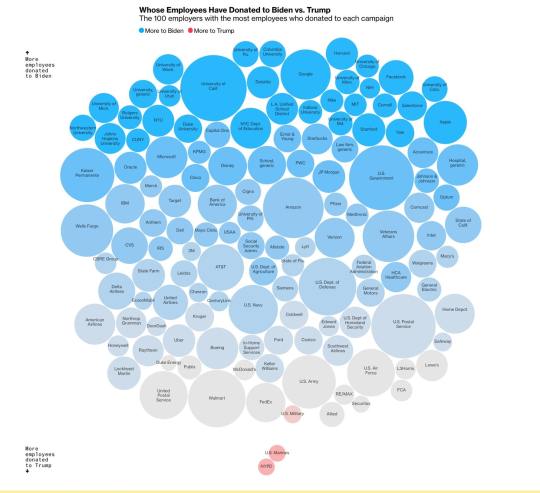
What jumps out to me in these figures is not only how left leaning large institutions are, but how the same is true for most professions. Whether you are looking by institution or by individuals, there are more donations to Biden than Trump. Yet Republicans get close to half the votes! Where are the Trump supporters? What these graphs reveal is a larger story, in which more people give to liberal causes and candidates than to conservative ones, even if Americans are about equally divided in which party they support (and no, this isn’t the result of liberals being wealthier, the connections between income and ideology or party are pretty weak). Here are some graphs from late October showing Biden having more individual donors than Trump in every battleground state.
…
In the 2012 election, Obama raised $234 million from small individual contributors, compared to $80 million for Romney, while also winning among large contributors.
…
In September 2009, at the height of the Tea Party movement, conservatives held the “Taxpayer March on Washington,” which drew something like 60,000-70,000 people, leading one newspaper to call it “the largest conservative protest ever to storm the Capitol.” Since that time, the annual anti-abortion March for Life rally in Washington has drawn massive crowds, with estimates for some years ranging widely from low six figures to mid-to-high six figures. March for Life is not to be confused with “March for Our Lives,” a pro-gun control rally that activists claim saw 800,000 people turn out in 2018. All these events were dwarfed by the Women’s March in opposition to Trump, which drew by one estimate “between 3,267,134 and 5,246,670 people in the United States (our best guess is 4,157,894). That translates into 1 percent to 1.6 percent of the U.S. population of 318,900,000 people (our best guess is 1.3 percent).” Even if the two left-wing academics who did this research are letting their bias infuse their work, there is no question that protesting is generally a left-wing activity, as conservatives themselves realize.
People who engage in protesting care more about politics than people who donate money, and people who donate money care more than people who simply vote. Imagine a pyramid with voters at the bottom and full-time activists on top, and as you move up the pyramid it gets much narrower and more left-wing. Multiple strands of evidence indicate this would basically be an accurate representation of society.
Another line of evidence showing that the left simply cares more about politics comes from Noah Carl, who has put together data showing liberals are in their personal lives more intolerant of conservatives than vice versa across numerous dimensions in the US and the UK. Those on the left are more likely to block someone on social media over their views, be upset if their child marries someone from the other side, and find it hard to be friends with or date someone they disagree with politically. Here are two graphs demonstrating the general point.
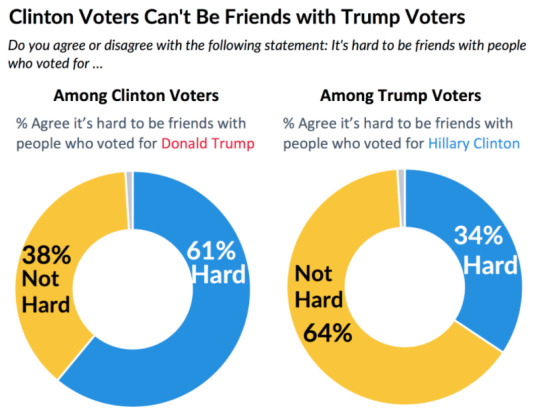

…
There’s a great irony here. Conservatives tend to be more skeptical of pure democracy, and believe in individuals coming together and forming civil society organizations away from government. Yet conservatives are extremely bad at gaining or maintaining control of institutions relative to liberals. It’s not because they are poorer or the party of the working class – again, I can’t stress enough how little economics predicts people’s political preferences – but because they are the party of those who simply care less about the future of their country.
Debates over voting rights make the opposite assumption, as conservatives tend to want more restrictions on voting, and liberals fewer, with National Review explicitly arguing against a purer form of democracy. Conservatives may be right that liberals are less likely to care enough to do basic things like bring a photo ID and correctly fill out a ballot. If this is true, Republicans are the party of people who care enough to vote when doing so is made slightly more difficult but not enough to do anything else, while Democrats are the party of both the most active and least active citizens. Yet while being the “care only enough to vote” party might be adequate for winning elections, the future belongs to those at the tail end of the distribution who really want to change the world.
The discussion here makes it hard to suggest reforms for conservatives. Do you want to give government more power over corporations? None of the regulators will be on your side. Leave corporations alone? Then you leave power to Woke Capital, though it must to a certain extent be disciplined and limited by the preferences of consumers. Start your own institutions? Good luck staffing them with competent people for normal NGO or media salaries, and if you’re not careful they’ll be captured by your enemies anyway, hence Conquest’s Second Law. And the media will be there every step of the way to declare any of your attempts at taking power to be pure fascism, and brush aside any resistance to your schemes as righteous anger, up to and including rioting and acts of violence.
…
From this perspective we might want to consider this passage from Scott Alexander, who writes the following in his review of a biography of Turkish president Recep Tayyip Erdogan.
The normal course of politics is various coalitions of elites and populace, each drawing from their own power bases. A normal political party, like a normal anything else, has elite leaders, analysts, propagandists, and managers, plus populace foot soldiers. Then there's an election, and sometimes our elites get in, and sometimes your elites get in, but getting a political party that's against the elites is really hard and usually the sort of thing that gets claimed rather than accomplished, because elites naturally rise to the top of everything.
But sometimes political parties can run on an explicitly anti-elite platform. In theory this sounds good - nobody wants to be elitist. In practice, this gets really nasty quickly. Democracy is a pure numbers game, so it's hard for the elites to control - the populace can genuinely seize the reins of a democracy if it really wants. But if that happens, the government will be arrayed against every other institution in the nation. Elites naturally rise to the top of everything - media, academia, culture - so all of those institutions will hate the new government and be hated by it in turn. Since all natural organic processes favor elites, if the government wants to win, it will have to destroy everything natural and organic - for example, shut down the regular media and replace it with a government-controlled media run by its supporters.
When elites use the government to promote elite culture, this usually looks like giving grants to the most promising up-and-coming artists recommended by the art schools themselves, and having the local art critics praise their taste and acumen. When the populace uses the government to promote popular culture against elite culture, this usually looks like some hamfisted attempt to designate some kind of "official" style based on what popular stereotypes think is "real art from back in the day when art was good", which every art school and art critic attacks as clueless Philistinism. Every artist in the country will make groundbreaking exciting new art criticizing the government's poor judgment, while the government desperately looks for a few technicians willing to take their money and make, I don't know, pretty landscape paintings or big neoclassical buildings.
The important point is that elite government can govern with a light touch, because everything naturally tends towards what they want and they just need to shepherd it along. But popular/anti-elite government has a strong tendency toward dictatorship, because it won't get what it wants without crushing every normal organic process. Thus the stereotype of the "right-wing strongman", who gets busy with the crushing.
So the idea of "right-wing populism" might invoke this general concept of somebody who, because they have made themselves the champion of the populace against the elites, will probably end up incentivized to crush all the organic processes of civil society, and yoke culture and academia to the will of government in a heavy-handed manner.
To put it in a different way, to steelman the populist position, democracy does not reflect the will of the citizenry, it reflects the will of an activist class, which is not representative of the general population. Populists, in order to bring institutions more in line with what the majority of the people want, need to rely on a more centralized and heavy-handed government. The strongman is liberation from elites, who aren’t the best citizens, but those with the most desire to control people’s lives, often to enforce their idiosyncratic belief system on the rest of the public, and also a liberation from having to become like elites in order to fight them, so conservatives don’t have to give up on things like hobbies and starting families and devote their lives to activism.
54 notes
·
View notes
Text
Just take this in for a moment. Some naysayers LOVE to argue that Kara isn't gay or pan or whichever term you wanna use, in the comics (except for that one timeline but that technically doesn't count either) and therefore, supercorp can't be endgame?
Hahaha can't? Really? Look, this is an ADAPTATION of a comic book character and the stories surrounding that character. Not a shot for shot remake! They can pretty much do what they want and take the characters in whichever direction they want. And they have! A few examples:
- creation of Alex Danvers and the Danvers backstory for Kara
- The fucking DEO
- Sam as Reign's human side and Sam's offspring Ruby
- Kelly Olsen
- Livewire as Supergirl's villain and not Superman's
- Winn
Need I go on?
I know that for the most part, they've spent these past six seasons retelling Superman stories (which is such a disservice to the rich comic book history SG has but that's a separate rant). But let's entertain the notion that this is a 'true portrayal' and that the showrunners are concerned with honouring the content.
I would love to then cast a spotlight on Mr. Querl Dox. He is the most consistent love interest for Kara in the comics and even in antimated shows. She dated Valor (who Mon El is based off of but starkly different too) a handful of times in comparison to Brainy and yet, no one really talks about that. If they really wanted to follow comic lore, he would've been a LI and Kara's endgame romance but it was clear from minute one that that was NOT their intention. And I guarantee you if it was, their casting choice for the role would've been way different (based off what they have chosen all the time: tall, muscular, dick to kara).
But even more than that, when is Kara's sexuality ever explicitly discussed? Sure she tells Winn she isn't gay in S1 but that doesn't automatically mean she's straight. In fact, I would think that sexuality doesn't even register to Kara. Just look at how confused she was during Alex's coming out - like she really couldn't understand why this was such a huge deal and the gravity behind Alex finally accepting this part of herself. Based off what we know about Krypton (and that's not including comics) what indication is there that their society cares about sexuality?
Why would the matrix give a damn about a person's gender, much less sexuality? Those things have literally no bearing on compatibility for their society's purposes. Bonding (or marriage) was arranged and the main thing was to benefit both Houses and the advancement of the planet. Again, gender would not play into this, they didn't procreate naturally, probably didn't even have sex recreationally either! So no, an advanced society like that that has perfected genetics? Yes they did not give a fuck about sexuality and gender.
And since Kara spent the first 13 years of her life there, I doubt she does either or even thinks about it. Maybe to fit in she conditioned herself to only show outward attraction to men and thought that that meant she'd be 'normal'.
Until Lena made it near impossible to do that anymore. Until Lena flirts and fills her office with flowers and goes on a date with Jack that she crashes like an unhinged, possessive lunatic. Until Lena buys CatCo without hesitation, treats Kara with respect and supports her career, inspired her to be her best self. Until Lena who she can't walk away from despite cutting things off with James before they even start or yeeting her so called epic love into space or shutting down William only to go out with him after yet another rejection at a partnership with Lena.
And the CW has the ability to make lasting change with a Supercorp endgame. Not only can this help pave the way for other queer characters in the future but also has the promise of permeating into the comic book lore. DC comics could potentially look at this and say 'fuck, we want this too' and boom, we have Lena and Kara together in future Supergirl issues. I seem to remember a similar thing happening for Harley Quinn so it's not like DC doesn't know where the fans and money are. Hopefully, the CW will too.
#honestly tho#this 'kara isn't gay' argument has no legs#she spent her formative years on krypton#a society that transcended the societal constructions restricting gender n sexuality#n lena has never been confirmed as anything either#NEVER#dating 'only men' is a stupid argument#plus there is a lot of time between boarding school and her move to NC#we don't know exactly what she was doing n who she was doing it with#only what they showed us#plus there is no way lena n andrea didnt experiment at st helena#so the ball is really in your court @cw#choose wisely#supercorp
19 notes
·
View notes
Text
Mitchell: The World as Exhibition
"The four Egyptians spent several days in the French capital, climbing twice the height (they were told) of the Great Pyramid in Alexandre Eiffel's new tower..."
"The Egyptian exhibit had been built by the French to represent a street of medieval Cairo...'It was intended,' one of the Egyptians wrote, 'to resemble the old aspect of Cairo.' So carefully was this done, he noted, that 'even the paint on the buildings was made dirty.'"
To the West, the rest of the world is archaic, antiquated spectacle – a curious view of the past, an antithesis to Western progress "in the right direction"
"The Egyptian visitors were disgusted by all this...Their final embarrassment had been to enter the door of the mosque and discover that...it had been erected as what the Europeans called a façade."
"Together with other non-European delegates, the Egyptians were received with hospitality–and a great curiosity...they found themselves something of an exhibit."
"What [can] this process of exhibiting tell us about the modern West[?]"
modernity as defined by the West positions its own culture as the norm and the mundane, from which "the ordering up of the world itself as an endless exhibition" can be procured as entertainment, curiosity, and an object of "interested study, intellectual analysis"
how can Islam's relationship with modernity be a positive one, defined as it is by this sort of cheapened commodification of its premises as entertainment for the "civilized West"?
Yuval Noah Harari in Sapiens posits that one of the key reasons for Western/European dominance is 'curiosity' and 'the cultural backing to question tradition/history.' Does the "curiosity of the European [encountered] in almost every subsequent Middle Eastern account" following the first Arabic description of 1800s Europe then become a defining factor/formidable strong suit of Western modernity?
Does the "[demonstration of] the history of human labor by means of 'objects and things themselves'" espoused by the European exhibitions of the latter 1800s speak to the beginnings of an increased focus on the "hardware" and "observable, empirical data" of any one subject of study?
Marr's 1982 argument in computational social science: any informational system can be analyzed via 1) problem/computation 2) algorithm 3) physical system hardware; science and especially neuroscience today emphasizes (3) and thus comes away, as argued by some, as an incomplete understanding of the way the brain works
i.e., a bird's mechanisms and purposes for flight cannot be deduced from the study of its physical hardware components alone (feather)
in the same way, an "object lesson" is not the definitive experience of another culture/lifestyle as imagined by the "Histoire du Travail" display of the 1889 Exhibition but rather an overemphasis on the "physical hardware" and material of that culture and European imaginations and (mis)interpretations of its computational/algorithmic functions and purposes
One major Arabic response to Western creations of spectacle is heavy documentation, "[devoting] hundreds of pages to describing the peculiar order and technique of these events–the curious crowds of spectators, the scholarly exhibit and the model...the systems of classifications...the lectures, the plans and the guide books–in short the entire machinery of what we think of as representation."
"They were taken to the theater, a place where Europeans represented their history to themselves..." – non-Western cultures are represented in the same fashion, as spectacle, as traditions and culture from the West's own history. In unifying their systems of representation the West has relegated the rest of the world, including the Arab world and Islam, to the same status as its own history
Is a society's/culture's own history also a form of subjugated knowledge? i.e., when history is remembered as tragic and painted as a negative, primitive state rather than a series of traditions and stories to be revered, does that indicate the modern knowledge vanquishing/subjugating the past knowledge?
"The Europe in Arabic accounts was a place of spectacle and visual arrangement, of the organization of everything, and everything organized to represent...some larger meaning."
"intizam al-manzar, the organization of the view" – is this...the panopticon? Western visual organization of spaces, spectacles, and symbols to convey their interpretations of non-Western cultures feels very much akin to a disciplinary technique to exercise power subtly over the bodies and <souls> of non-Western individuals/populations.
the spectator role holds no power – the spectator can only witness and be complicit to his own objectification
'objectification' in the sense that the individual becomes a material representation of 'the Orient' or 'the East' and all of his actions, thoughts, speech, mannerisms are subsequently first filtered through the lens of this representation to fit to the Western idea of 'his culture and people' before they are attributed to him, and the resulting communication of his identity and actions is so garbled and perverted that it really only serves to reinforce the West's perception of them.
"First, there was the apparent realism of the representation. The model or display always seemed to stand in perfect correspondence to the external world...Second, the model, however realistic, always remained distinguishable from the reality it claimed to represent...the medieval Egyptian street at the Paris Exhibition remained only a Parisian copy of the Oriental original."
Is this an example of Baudrillard's hyperreality? And if it is, does that mean that, as he states, 'neither the representation nor the real remains, just the hyperreal'?
furthermore, if only the hyperreal remains, what is the hyperreal? we know that the representation is the Parisian perception of the non-Western world, and that the real is the non-Western world itself (but is that world in the past or the present?)
so in this instance I suppose neither of them remain and the strangely perfect-but-not "Parisian copy of the Oriental original" is the only thing present – the "effect called the real world"
"...the world of representation is being admired for its dazzling order, yet the suspicion remains that all this reality is only an effect."
Is the "search for a pictorial certainty of representation" unique to the West?
was the creation of hyperreality uniquely borne of Western society? The argument is that the East is "...a world where, unlike the West, such 'objectivity' was not yet build in"
does Western hyperreality alone fall between Islam and an understanding reached with Western Judeo-Christian societies?
can the obstacle of exhibition/spectacle be overcome? Who needs to make the first step to overcome it, the West or the East? What does this first step look like, and it is actually possible to achieve given the nature of media coverage and social media in the modern era that creates a new hyperreality with regards to our understanding of the outside world?
The only objects and locations of value to Western modernity are those whose "pictorial certainties of representation" can inspire awe, wonder, marvel – or fit in with the overall Western representation of non-Western cultures as an exhibition of interest.
"The ability to see without being seen confirmed one's separation from the world, and constituted, at the same time, a position of power." – the panopticon guard!!
"To establish the objectness of the Orient, as a picture-reality containing no sign of the increasingly pervasive European presence required that the presence itself, ideally, become invisible." – this harkens to covert US support of Middle Eastern regimes that benefitted its own oil interests in the area while at the same time performing espousal of the area's "democratic rule" and "self-governance," "autonomy"
in pursuing an "authentic experience" as an outsider, the European spectator necessarily creates his flawed, hyperrealistic representation of the non-Western individual by appropriating "the dress and [feigning] the religious belief of the local Muslim inhabitants" as his disguise of invisibility and non-perception, despite "...being a person who had no right to intrude among them."
"Unaware that the Orient has not been arranged as an exhibition, the visitor nevertheless attempts to carry out the characteristic cognitive maneuver of the modern subject, separating himself from an object-world and observing it from a position that is invisible and set apart."
Western modernity is the European pursuit and implementation of a hyperreal representation of Islam with the underlying desire to both observe the true nature of the spectacle within and remain unobserved (thus holding onto a position of power)
"This, then, was the contradiction of Orientalism. Europeans brought to the Middle East the cognitive habits of the world-as-exhibition, and tried to grasp the Orient as a picture."
I'm not sure if this is still the prevalent world-view, or if it is one example of the Western tendency to impose its own perspective of the Middle East onto the reality of issues in Arab and non-Western countries
i.e., the viewpoint that democratization is the best and inevitable system of governance and steps away from it are 'regression' towards 'the archaic past'
when the Orient that is not created as an exhibition fails to meet the European spectator's expectations, that reality is 1) dismissed as inferior or 2) painted as corrupted by non-Western modernity, which is always 'straying away from the true form of the Orient,' which can now only be found in European definitions of the non-Western world in the eyes of the European tourist/scholar
very similar to Christian scholars stating that they 'saved Buddhism' by 'rediscovering the pure, original form of the religion' beneath 'idolatry and other corruptions of the core Buddhism'
14 notes
·
View notes